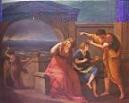








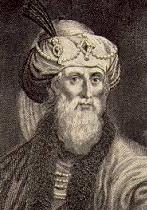






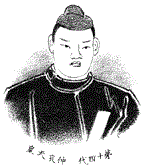



















| Country | Leader | From | To | |
| Roman Empire | Trajan (53-117) | 98 | 117 |  |







100 Roman consuls: Marcus Ulpius Trajanus and Sextus Julius Frontinus; Pliny the Younger (62-113) becomes consul, writing a Panegyric to Trajan; Lucius Neratius Marcellus (friend of Pliny the Younger) becomes Roman gov. #15 of Britain (until 103), fighting in N Britain and fixing the frontier at the line of the Stanegate (stone road) from Carlisle to Corbridge. In this cent. the U.S. Southwest experiences a 50-year drought and 100-year dry period. In this cent. the port city of Sarapion (Serapion) on the Indian Ocean coast in modern-day S Somalia is first mentioned, later becoming Mogadishu (Xamar) (Hamar) ("tamarind") (modern-day pop. 2.4M). In this cent. there is a city on Socotra Island in the Indian Ocean, the most alien-looking place on earth, known for Dragon's Blood trees; discovered by Russian archeologists in 2010. In this cent. the Adamites (Adamians) Christian sect arises in North Africa, going nude during religious services (ends in the 4th cent.). About this time Roman soldiers stationed at Celt-filled Ft. Vindolana in Britain drink local beers made by brewer Atrecus et al. In this cent. the extensive Roman road system is built. In this decade Roman colonies are built in Africa; the Roman legion III Augusta is based in Thamugadi, Numidia. About this time the Kingdom of Axum (Aksum) (Aksumite Empire) in N Ethiopia and Eritrea is founded (ends 940), with a wealthy economy based on trade in the Red Sea and Mediterranean, establishing hegemony over the Kingdom of Kush and eventually conquering the Himyarite Kingdom in Yemen after crossing the Bab-el-Mandeb (Mandab Strait) (Arab. "Gateway of Tears") between Yemen and modern-day Eritrea-Djibouti, becoming one of the four great kingdoms along with Persia, Rome, and China. By this decade the Christian communities are becoming divided into episkopoi (supervisors) (bishops) (papas), presbyteroi (elders), and laikoi (laity) (sheep); an episcopal see is set up in #2 wealthiest Roman city Arles (Arelas) about this time. In this cent. Mug Nuadat (servant of mythical king Nuada), son of Mug Neit, son of Derg, son of Dergthene, son of Enna Munchain, son of Loch Mor, son of Muiredach Mucna, son of Eochaid Garb, son of Dui Dalta Dedad, all of the Clanna Dergthened (Deirgtine) (from Gaul?) becomes king of Munster in S Ireland, becoming a rival of Conn of the Hundred Battles, ruling the lands S of a line between Galway Bay and Dublin known as Leth Moga (Mug's half), while everything N of that line becomes known as Leth Cuinn (Conn's half) until Conn drives Mug to exile in Spain, then defeats and kills him at Mag Lena in modern-day Kilbride, County Offaly. A gynecologist with a sore anus took a hypocritical oath? In this cent. Greek physician Soranus of Ephesus dies, leaving "On Acute and Chronic Diseases" (describing the Guinea Worm), "Treatise on Gynecology" (4 vols.), "De Anima" (4 vols.) (which divides the soul into seven parts and denies its immortality), "Two Treatises on Pharmacy", and The Life of Hippocrates [fl. 400 B.C.E.], the earliest surviving bio. and source of most info. on him. In this cent. Roman historian Lucius Anneus (Julius) (Publius Annius?) Florus flourishes, writing Epitome of Roman History, covering from the foundation of Rome to the year 25 B.C.E., which becomes popular in the Middle Ages despite being full of errors; it describes the city of Florentia (modern-day Florence) in N Italy as a most splendid metropolis. In this cent. (?) Christians in Cappadocia begin enlarging old Hittite underground cities carved in solid rock, adding seven more levels to give a total of eight, with a Christian cross-shaped church at the bottom level. About this time Roman emperor (98-117) Trajan (Marcus Ulpius Traianus) (53-117) makes longtime Thracian-Celtic Serdi tribe town Sardica (Ulpia Serdica) (modern-day Sofia, Bulgaria, pop. 1.26M/1.68M) a municipium (center of an admin. region) of Rome, and it is built-up with walls, baths, amphitheater, and all the other good stuff; in the 14th cent. the name Sofia begins to be used after St. Sofia Church. About this time Trajan builds Timgad in Algeria, based on a checkerboard pattern, with a famous library. In this cent. the Celtic fort on Burnswark Hill in SW Scotland is sieged by the Romans, who use whistling sling bullets to terrorize them. About this time Greek physician Archigenes, son of Philippus, pupil of Agathinus practices in Rome under the reign of Trajan, becoming a star, making several disciples and leaving a treatise on the pulse, which Galen writes a commentary on; too bad, he casts his medical works in a dialectic form, causing them to be filled with moose hockey, introducing many new and obscure terms. About this time the Paracas Culture in Peru is forcefully supplanted by the Nazca (Nasca) Culture, which last until 800 C.E., and creat the Nazca Lines in 400-650 C.E. In this cent. the city of Nagoya, Japan (modern pop. 2M) is founded as the site of a Buddhist temple. In this cent. the city of Otsu in Shiga Prefecture, Honshu Island on Lake Biwa (10 mi. E of Kyoto) becomes the site of the Japanese imperial court. Jesus missed the New World, and look what happened? In this cent. the Britons begin adopting the Roman custom of shaving and wearing their hair short, and add the Roman Nov. 1 festival in honor of Pomona, goddess of fruits to the Celtic festival of Halloween, later evolving into ducking for apples and the illumination of carved pumpkins with candles; the Christians later turn Nov. 1 into Hallowmas (Allhallowmas) (Allhallows) (All Saints') Day and Nov. 2 into All Souls' Day in an attempt at Catholic-style get-em-in-anyway-u-can conversion. In this cent. St. Gervaius and St. Protasius flourish, becoming patron saints of Milan and of haymakers, invoked for the discovery of thieves; feast day: June 19 (West)/Oct. 14 (East). About this time the Moche Culture in coastal N Peru near modern-day Moche and Trujillo arises (until 800), producing monochromatic Chimu Pottery, known for portraying porno incl. heterosexual and homosexual acts. In this cent. the Fianna Irish Celtic warriors are formed, later becoming a wet dream for Irish Fenian independence movements. Early in this cent. Nilotic peoples incl. Luo and Ateker enter Uganda from the N, settling in the N and E. In this cent. the Nobades (Nobatae) (Nobadae) invade from the W and occupy the W bank of the Nile River in N Kush (Lower Nubia)), going on to intermarry with the people of Meriotic Kush and help them fight the N expansion of Axum. In this cent. the harbor town of Riga on the Daugava River is founded by the pagan Finnic tribe of Livs. In this cent. the Mayans build the city of Lakamha ("big water") in modern-day Palenque, Chiapas, Mexico, with 1.5K bldgs. and a pop. of 6K, incl. an intricate water mgt. system; they discover vulcanization of rubber and produce bouncy rubber balls, rubber sandals, etc.? Late in this cent. the Christians begin using the Ichthys (Fish) Symbol (Jesus Fish) (Holy Mackerel) for a secret sign, allegedly standing for Jesus Christ Son of God (Iota Chi Theta Upsilon Sigma) (Iesous Christos Theou Huios Soter), and having something to do with baptism; really a throwback to Dagon the fish god, also the symbol of Adonis in the Syrian mysteries, used by the Pythagoreans also? The original Peter, Paul and Mary? The Gnostic School (Gk. "gnosis" = knowledge) is founded in this cent., producing a large variety of lit. about Jesus and other early Christian figures incl. Peter, Paul, and Mary Magdalene; Docetism (Gr. "dokeo" = to seem) claims that Jesus is either a phantasm or a dualistic creature with divine and human natures, and that only the human part died on the cross (while the divine part floated in the air laughing at his human part?). In this cent. Jewish scholar Simon Ben Azzai flourishes; "In seeking wisdom thou art wise; in imagining that thou hast attained it thou art a fool." In this cent. the Christian cult begins adopting the Codex (book format with pages), giving them a competitive advantage in ease of transmission of propaganda compared to lame scrolls - the original Apple Computer? In this cent. the triple interlocking Borromean Rings are first used in Gandharva Buddhist art in Afghanistan. Science: About this time the Chinese begin using crushed chrysanthemum flowers (active ingredient pyrethrum) to kill insects, becoming the first insecticide. Nonfiction: In this cent. an Egyptian papyrus containing wisdom texts is written, revealing that the goddess Isis gave as much power and honor to women as to men, permitting them to own property, practice professions include medicine, and serve as witnesses, plaintiffs, and defendants in court. The The Odes of Solomon by the Jewish baptismal sect of Elkesaites in Syria is written - the earliest known Syriac text. The Masoretes in Tiberias begin compiling the Massorah, the standard Hebrew scriptures with vowel marks (finished in 1000). Alleged date of the Revelation (Apocalypse) of John, the mother lode of Millennium Fever (MF). Approx. date of the Greek Testament of Isaac, composed in Egypt and later embellished with Christian beliefs. The Hotsuma Tsutaye 10K-line epic poem incl. the origin of the Japanese language and an alchemical theory of matter. In the 2nd-3rd cents. C.E. Gnostic writings flood the scene, incl. the Gospel of Thomas (alleged sayings of Jesus, which are later trans. to Coptic and buried c. 340 near Nag Hammadi, Egypt), Apocalypse of Baruch, Epistle of the Apostles, Second Epistle of Clement, The Gospel of Mary, The Gospel of Philip ("And the companion of the Saviour is Mary Magdalene. Christ loved her more than all the disciples and used to kiss her often on her mouth"), The Ophite Diagrams, The Dialogue of the Savior, The Apocryphon of John, Trimorphic Protennoia, The Valentinian Exposition, The Apocryphon of James, and The Epistle of Mathetes to Diognetus, which contains the soundbyte about Christians that they: "dwell in their own countries, but only as aliens; as citizens they take part in everything, but endure all hardships as strangers; every foreign land is a fatherland to them, and every fatherland is foreign. They inhabit the earth, but they hold citizenship in heaven." In this cent. the Corpus Hermeticum ancient Greek-Egyptian wisdom texts are redacted in the form of dialogues with Hermes Trismegistus ("Thrice-Greatest"), launching Hermeticism in the West, with a basic belief in the Four Elements of the Universe, and the Seven Intermediary Planetary Spirits created by God to govern destiny; in ancient times the god Hermes was worshipped in the form of a square pillar with a head and beard, and the Caduceus was his symbol; "Seeing within myself an immaterial vision that came from the mercy of God, I went out of myself into an immortal body, and now I am not what I was before. I have been born in mind!" In this cent. the 2nd cent. B.C.E. Martyrdom of Isaiah begins to be added to by New Kid on the Block Christians, the original five chapters augmented by five more describing Isaiah's ascension to Heaven and vision of Jesus' life and resurrection. In this cent. Jewish rabbi Yossi (Yose) Ben Halafta writes the Seder Olam, dating Creation to -3,671. Births: Roman Gnostic teacher Valentinus (d. 155) in Phrebonus, Upper Egypt; disciple of St. Paul's disciple Theudas in Alexandria. Roman jurist Salvius Julianus (Julian the Jurist) (Lucius Octavius Cornelius Publius Salvius Julianus Aemilianus) (d. 160) (110-170>) in Puppet (near Hadrumentum), Africa. Roman Christian apologist (St.) Justin (the) Martyr (d. 165) in Flavia Neapolis (Shechem, Judaea) (modern-day Nablus); feast day: Apr. 14/June 1. Deaths: Greek Pythagorean philosopher Apollonius of Tyana (b. -3). Jewish Christian apostle St. John (b. 6) in Ephesus; the last apostle of Jesus to bite the dust, er, go to Heaven, the rest all having been martyred? Jewish titleless king Marcus Julius Herod Agrippa II (b. 27); dies childless (Acts 25-26). Chinese philosopher Wang Chong (b. 27).

101 The 220th Olympiad. Roman consuls: Marcus Ulpius Trajanus and Quintus Articuleus Petus. The First Dacian-Roman War in modern-day Romania begins (ends -102) when Decebalus sues for peace in vain, and Trajan, lusting for Dacia's gold invades, along with his ward Hadrian, who distinguishes himself and is rewarded with the governorship of Lower Pannonia. Pacorus II of Parthia sends an embassy to the Han Dynasty in China, which calls them the Anxi Kingdom. Births: Roman gen. (gov. of Britain in 139-42) Quintus Lollius Urbicus (d. 151) in Tiddis, Numidia (Algeria); 2nd or 3rd son of a Libyan Berber landowner. Greeek rhetorician Herodes Atticus (Lucius Vibullius Hipparchus Tiberius Claudius Atticus Herodes Marathonios (d. 177) in Marathon, Attica; his grandfather Hipparchus (40-) was worth 100M sesterces, richest man in the Greek world, until Domitian confiscated it and murdered him; his father Atticus (65-) finds part of it hidden away in 96, and purchases a seat in the Roman Senate, rehabilitating the family Mafia, er, Roman style. Deaths: Roman poet Caius Silius Italicus (b. 25); leaves Punica. Jewish turncoat historian Josephus (b. 37); leaves The Jewish War (ca. 75), Antiquities of the Jews (c. 94), Against Apion, and Autobiography; too bad, his works end up as the main source for Jewish history in the critical 1st cent., and since they contain no awareness of the subversive Christian movement they cause later interpolators to have a field day turning him into a Christian?; since that's all later writers would have to work with, did the Gospel writers copy Jesus' missionary tour by aping the tour of cities Roman emperor Titus made of Palestine in 70 C.E., while making his miracles ape the Greek Septuagint Old Testament, giving them away?
102 Roman consuls: Lucius Julius Ursus Servianus and Lucius Licinius Sura. Trajan's First Dacian War (begun 101) ends with a peace treaty and baksheesh. Deaths: Chinese Han gen. Ban Chao (b. 32) in Luoyang; dies after being created the marquess of Dingyuan (Chin. "stabilized faraway places").
103 Gaius Vibius Maximus issues an edict ordering all people to return to their homes for the Roman census - proving the Gospel of Luke Ch. 2 to be true, or proving that the Gospel writers aped him and backdated it to Jesus' day? Pliny the Younger becomes gov. of Provincia Pontica (until 105). Roman consuls: Marcus Ulpius Trajanus and Manius Laberius Maximus. Deaths: Roman water-lover Sextus Julius Frontinus (b. 40); leaves Strategemata, De Aquis (Aquaeductibus) Urbis Romae, and De Agrorum Qualitate. Roman epigrammist Martial (b. 38); leaves Epigrams (12 vols.), revealing Roman life between the reigns of Nero and Trajan.
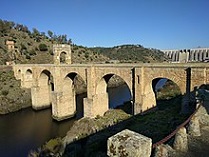
104 Roman consuls: Sextus Attius Suburanus Aemilianus and Marcus Asinius Marcellus. Architecture: In 104-106 C.E. the Alcantara (Alcántara) Bridge is built in Alcantara (Arab. "the bridge"), Extremadura, Spain by order of Roman emperor Trajan.

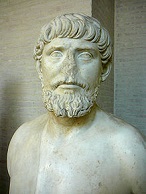
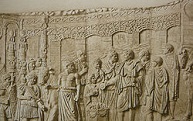



105 The 221st Olympiad. On Feb. 13 Han He Di (b. 79) dies, and his 3-mo.-old son Han Shang (Chin. "short-lived") Di (-106) becomes Dong Han emperor #5 of China (until 106), with dowager empress Deng Sui (Hexi) (Chin. "moderate and pacifying empress") (81-121) (He Di's 2nd wife) as regent, becoming the last effective ruler of the crumbling Dong (Eastern) Han Dynasty. The Second Dacian-Roman War of Roman emperor #13 (98-117) Trajan (53-117) begins when Decebalus breaks the treaty with Rome (ends 106), and Trajan, knowing of their gold and silver mines and strapped for cash sees his chance, having his chief architect Apollodorus of Damascus build the segmental arch Bridge of Apollodorus (Trajan) over the Danube River, becoming the first bridge over the Lower Danube River, and longest arch bridge in total and span length for the next millennium; too bad, it only lasts a few decades. Pliny the Younger's governorship of Provincia Pontia ends. Vologases III (-147) becomes king of the Parthians. St. Evaristus dies, and (St.) Alexander I (d. 115), a disciple of Plutarch is elected bishop of Rome (pope #6). Roman consuls: Tiberius Julius Candidus Marius Celsus and Gaius Antius. Inventions: Chinese eunuch Cai Lun (T'sai-lun) (50-121) invents felted sheeted fiber paper made of tree bark, hemp, cloth rags, and fishing nets, replacing bamboo and silk tablets - this gives the Jesus Christ scam away, since if he really was the Son of God, and needed his message spread fast, he would have invented papermaking, printing presses, and maybe copyright and trademark protection for his new world-domination church instead of relying on godless heathens to do it for him, and blind luck to transmit the knowledge to his believers? Deaths: Chinese Dong Han emperor #4 (88-10) He Di (b. 79) on Feb. 13. Nabatean king Rabel II on Mar. 22.


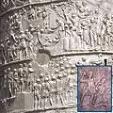
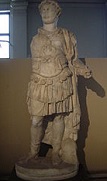

106 Roman consuls: Lucius Ceionius Commodus and Sextus Vettulenus Civica Cerialius. In Aug.-Sept. Shang Di dies, and 12-y.-o. Prince Hu Liu (grandson of emperor Zhang Di) succeeds as Han An (Chin. "peaceful") Di (94-125), Dong Han emperor #6 of China (until 126), with his stepmother, dowager empress Deng Sui remaining as regent until her death in 121; Japan sends an ambassador. The Third (Trajan) Persecution of the Church begins under Trajan (ends 117). The Romans invade Dacia and capture their capital city of Sarmizegetusa, and Trajan's Second Dacian War (begun 105) ends; defeated Dacia, based in Transylvania and inhabited by the Daci (emigrants from Thrace) is made a Roman province, with capital at Ulpia Traiana Sarmizegetusa 40 km. away, and Roman colonists are sent to loot its valuable gold and silver mines, while the lessons learned in 9 C.E. in Germania teach the Romans to totally exterminate their pop. and culture, which is why it is later called Romania?; only 40 aristocrats remain?; Decebalus drinks poison hemlock to evade capture, and his companions are captured and tortured to reveal the secret location of his treasure under a riverbed; 16K tons of gold and ?K tons of silver are mined, financing Roman building programs incl. Trajan's Forum (finished 112) N of the Roman Forum with the sculptured 100-ft. Trajan's Column (finished 113) commemorating the Dacian V in the NW portion, becoming the most magnificent of all Roman forums, consecrated to the Son, er, Sun; the column shows severed Dacian heads being displayed on the walls, as if the Dacians were the good guys and the Romans the barbarians?; the chief architect is Apollodorus of Damascus; there are now no barbarians left who are wealthy enough to conquer, causing the final Roman boundary to be set?; in the 1950s a Frieze of a Griffin from the ruins is dug up; too bad, Apollodorus offends Hadrian, who has him banished, convicted of imaginary crimes, and executed. Seizing on the death of Rabel II, Roman emperor Trajan conquers the Nabataeans (who control the borderland between Syria and Arabia from the Euphrates River to the Red Sea) along with their sandstone capital of Petra (Gr. "rock") in S Jordan, and makes Nabataea a part of the new Roman province of Arabia Petraea (only the part N of the Red Sea), with capital at Busra (Bosra) in S Syria, which is renamed New Trajan Busra; the Nabataean kingdom ceases to exist, although Petra is still a trading center, and the Aramaic-speaking Nabataeans later develop the Arabic script, becoming the real Mecca, which is later covered-up?; the town of Mamshit shifts from trading to horse breeding. The Roman camp of Aquincum, on the Danube Plains on the site of modern-day Budapest (modern pop. 2M) becomes capital of the Roman province of Pannonia Inferior, developing a pop. of 20K. Architecture: Roman gov. of Asia (105-7) Tiberius Julius Celsus Polemeanus (45-119), has the Library of Celsius built in Ephesus in 114-17, with porticos facing E to catch the morning light, holding 12K scrolls, becoming his crypt, going on to house 12K scrolls before it is destroyed in 262 - shove a celsius-graduated pole in what? Deaths: Chinese Han emperor Xiaode (crown prince Xiao of Qinghe) (b. 78).
107 Roman consuls: Lucius Licinius Sura and Quintus Soscius Senecio.
108 Roman consuls: Appius Annius Trebonius Gallus and Marcus Appius Bradua. Roman legion IX Hispana leaves Britain.

109 The 222nd Olympiad. Nahapana ruler (since 106) Gautamiputra Yajna Satakarni (d. 130 conquers Surashtra in the Deccan Plateau of India from the Vindhyas to Banavasi. Osroes I (d. 129) challenges Vologases III for the throne of Parthia. Abgar VII (d. 116) becomes ruler of Edessa, buying the kingdom of Osroene from Pacorus II of Parthia. Roman consuls: Aulus Cornelius Palma Frontonianus and Publius Calvisius Tullus Rusonus. Architecture: On June 24 the Aqua Traina Aqueduct is inaugurated, bringing water from Lake Bracciano 25 mi. NW of Rome, and used to feed water mills on the Janiculum; in 537 the Ostrogths cut it while sieging Rome; it it is later rebuilt and named Acqua Paola.
110 The Pantheon burns down again. Pliny the Younger is sent as a legate to reorganize the finances of the province of Bithynia on the S shore of the Black Sea; meanwhile overseers (curatores) are sent throughout the Roman Empire to supervise the troubled finances of various cities, while the Roman imperial fiscus loans money for the alimentarii (poor children). Bishop St. Ignatius of Antioch writes a Letter to the Christian Church at Ephesus while on a forced march through the province of Asia en route to Rome, and mentions Onesimus as its bishop; the term "catholic" (Gr. katholikos = "universal" = kath holou = "in general") is coined in a Letter to the Christians of Smyrna. Roman consuls: Marcus Peduceus Priscinus and Servius Cornelius Scipio Salvidienus Orphitus. Births: Greek traveler-geographer Pausanias (d. 180) in Lydia.
111 Luctacus (d. 114) becomes king of Scotland. Roman consuls: Gaius Calpurnius Piso and Marcus Vettius Bolanus.
112 The Roman harbor at Porto near Ostia is completed. Traditional date of the martyrdoms of Sharbil, Babai and Barsamy in Edessa. Roman consuls: Marcus Ulpius Trajanus and Titus Sextius Africanus. Deaths: Greek philosopher-historian Dion Chrysostomus (b. 40); leaves Discourses.
113 The 223rd Olympiad. Pliny the Younger, Roman gov. of Bithynia writes Letters to Emperor Trajan asking what to do about the !*?! Christians, and describing how he tortured two ladies and they wouldn't give the stuff up; he then dies, leaving his Epistulae ad Traianum (Letters to Trajan), along with two villas in Comum (Como) on Lake Larian. Trajan's Parthian War begins (ends 117) when Rome declares war, and Trajan leaves Italy for his great expedition to the East; Roman soldiers bathe in the Persian Gulf for the first time; Hadrian distinguishes himself again, and is made gov. of the Eastern Empire with capital in Antioch. Trajan's Column is built to glorify his military victories against the Getae. The serif is first used in Roman writing. Roman consuls: Lucius Publilius Celsus and Gaius Clodius Crispinus.
114 After envoys from Abgar VII of Edessa send envoys to him at Antioch, Big Bad Trajan becomes the first Roman emperor in 167 years to dare to cross the Euphrates River with a Roman army, scoring Vs against the Parthians. Mogaldus (d. 150) becomes king of the Picts (Scotland). Roman consuls: Quintus Ninnius Gasta and Publius Manilius Vopiscus Vicinillianus. Inventions: The Romans begin giving the letter V (originally the Hebrew letter Waw, representing a hook, which the Greeks adopted as their letter Upsilon), the letter D (from the Hebrew letter Daleth, meaning door) et al. pointed-rounded capital shapes.



115 Roman emperor Trajan campaigns in Mesopotania, enjoying fresh oysters sent by Roman chef Apicius, who invents a new way of packing them for travel; after Nisibis and Parthian capital Ctesiphon are captured, the new Roman provinces of Armenia, Mesopotamia (Babylonia) (116-17), and Osrhoene (Osroene) (Osroëne) in Upper Mesopotamis (capital city Edessa) are annexed by Rome, and Trajan gains the name Parthicus - bringing Christianity with them? Marcus Appius (Atillius) Bradua becomes Roman gov. of Britain #16 (until 118), leaving an inscription in Gwynedd mentioning his name. The Kitos (Heb. "rebellion of the exile") (Second Jewish-Roman) War in Jerusalem, provoked by Roman procurator (son of a tribal lord from Morocco, hence black?) Lucius Quietus begins (ends 117); the Jews briefly capture Nisibis. The Britons revolt and annihilate the Roman garrison in Eboracum (York). St. Alexander I is beheaded by the Romans on the Via Nomentana outside Rome, and (St.) Sixtus (Xystus) I (-125) becomes the sixtus plus 1, er, 7th bishop of Rome (pope #7). Vema Kadphises dies, and Kanishka I (-150) becomes ruler of the Buddhist Kushan Dynasty, which now incl. Turkestan and Afghanistan (Kashgar, Yarkand, Khotan), and calls the Second Great Buddhist Council. The man who corrupted First Century Christianity with the belief in the divinity of Christ, or was it like that from the days of St. Peter and he is only the first to write it down? (St.) Ignatius of Antioch (35-117) is taken by Roman soldiers to Rome, and during his journey writes Six (Seven) Letters to the Churches in Ephesus, Magnesia, Trallia, Rome, Philadelphia, and Smyrna, where he stops en route, writing four of them there?; he becomes the first to call Jesus Christ "our God" (letter to the Ephesians), and extols the office of bishop, saying "one must look upon the bishop as the Lord himself" (Eph. 6.1), claiming that he presides in the place of God (Mag. 6.1); he extols the Eucharist, and notes that Christians now celebrate the Lord's Day (Sunday) instead of the Jewish Sabbath (Saturday); he claims that martyrdom is a means to "attain to God" (Rom. 4.1). Roman consuls: Lucius Vipsanus Messala and Marcus Pedon Vergilianus. Births: Chinese Dong Han emperor #7 (126-44) Shun (Chin. "serene") Di (Shun-ti) (Bao Liu) (d. 144); son of An Di (94-125) and consort Li.

116 Abgar VII of Edessa switches from the Roman to the Parthian side; Trajan advances into Parthia, reaching the capital of Ctesiphone, then sends Lucius Quietus, who captures Edessa, sacks it, and kills Abgar VII; Parthamaspates (-123), son of Osroes I vies for the Parthian throne, is forced out of Parthia, and given a throne in Osrhoene (between Syria and Asia Minor) by Syrian legate (future emperor) Hadrian; Trajan is within one day's march of the Chinese border garrisons set up by Ban Chao in 97, but notes their presence, later leading to the first Roman embassy in 166? Rome annexes the province of Mesopotamia. Roman consuls: Lucius Fundanius Laminus Aelianus and Sextus Carminius Vetus. Births: Chinese Dong Han empress Liang Na (Shunlie) (Chin. "kind and achieving") (d. 150); wife of Shun Di (115-44). Deaths: Chinese historian Ban Zhao (b. 45).
117 - The Abe Lincoln of Roman Emperors Raises a Gay Boy to God Year? A Good Year to be Gay?


117 The 224th Olympiad. Roman census. Roman emperor (since 98) Trajan (b. 53) conquers Parthian territory incl. Armenia, and annexes the province of Assyria, ending the Parthian War (begun -113), then marches to the Persian Gulf, but is recalled by a widespread revolt of the Jews and of the newly conquered areas, suppressing both with great severity, and being repulsed from the Iraqi desert town of Hatra; on June 22 (July 9?) he dies in Selinus in Cilicia after naming as his successor on his deathbed his ward and 2nd cousin (legate of Syria) (not really - his wife Plotina makes it up after he pays the troops up?) (#3 of the Five Good Emperors) Hadrian (Publius Aelius Traianus Hadrianus) (75-138), who is met at the gates of Rome following a triumphal return from Syria (by a bunch of beard-wearing admirers?), and on Aug. 11 becomes Roman emperor #14 (until 138); the Roman Empire reaches its maximum territory, incl. most of Europe, the Middle East, and the N coast of Africa; Hadrian is a big fan of ancient Greek culture, and is called Graeculus (Little Greek), sparking a renaissance of Greek culture led by wealthy Greek scholar Herodes Atticus (101-77); Hadrian beautifies Athens and restores many ruined Greek cities, which bask until the Goths crush them in 267-8; first Roman emperor to wear a beard (making him the Roman Abraham Lincoln?); although married he is childless, and bi; the Beard proves one of the most able emperors, instituting a just system of taxation, ameliorating the lot of the slaves, and enforcing military discipline, issuing an edict forbidding Roman officials to pay attention to public denunciations against Christians unless they are accused of a real crime; (a gay emperor originated the Don't Ask Don't Tell Policy for Christians?); he hires historian Suetonius (69-140) as his private secy., then spends most of his reign (121-6, 128-34) traveling through the provinces, digging up its past and writing about it, and erecting many bldgs. - the Historyscoper Emperor? Traditional date of the martyrdom of Christian Bishop Semsoun in Arbela. In 117-138 Gnostic teacher Basilides of Alexandria flourishes, writing his own gospel and teaching about the mystical Abraxas (Abrasax), ruler of the 365 heavens, and the Pleroma, the totality of divine powers. Roman consuls: Quintus Aquilius Niger and Marcus Rebilus Apronianus. Nonfiction: Anon., P52; the earliest known gospel ms., consisting of a fragment of the Gospel of John (ch. 18), housed in the John Rylands Library in Manchester, England. Deaths: Roman Christian bishop St. Ignatius of Antioch (b. 35) in Rome (martyred by being fed to the lions in the Colosseum) (d. 108?).

118 Hadrian abandons the new provinces of Mesopotamia and Assyria across the Euphrates, and allows the Jews to return to Jerusalem, granting permission for the rebuilding of their Jewish Temple of Jehovah, but soon reneges and begins deporting Jews to N Africa and prohibiting those disgusting circumcisions - waste of good chewing gum? Praetorian prefect P. Acilius Attianus executes four ex-consuls for plotting against Hadrian. Quintus Pompeius Falco, former gov. of Moesia Inferior in 116-7 becomes Roman gov. #17 of Britain (until 122), immediately suppressing a revolt of the Brigantes and/or Selgovae of N Britain and S Caledonia, according to an inscription in Jarrow. Hadrian begins appointing equestrians rather than freedmen to posts in the imperial secretariat, and replaces companies of publicans with individual tax collectors under municipal supervision, lightening or remitting some taxes; he also builds the permanent camp of the III Augustan Legion at Lambaesis in Numidia, and grants Singidunum in Moesia municipal rights. About this time emperor Trajan renames the town of Parthenopolis on the right bank of the Danube in Lower Moesia as Marcianopolis after his sister Marciana. Roman consuls: Publius Aelius Trajanus Hadrianus and Gnaeus Pedanius Fuscus Salinator. Architecture: Roman Emperor Hadrian begins rebuilding the Pantheon on the Campus Martius in Rome (finished 120), becoming the world's largest unreinforced solid concrete dome; the lightweight concrete used sets and hardens from the inside out, making it last until modern times? Deaths: Roman historian Tacitus (b. 55); leaves The Histories (14 vols.); covers the Year of the Four Emperors (69 C.E.) to Domitian's death in 96; The Annals of Imperial Rome (16 vols.); his masterpiece; from the death of Augustus in 14 C.E. to the death of Nero in 68 C.E.; the Romans "make a desert and call it peace". Italian Christian bishop (St.) Terentian(us) (b. ?) of Todi; beheaded by the Romans after his tongue is cut out; feast day: Sept. 1. Roman Christian martyr (St.) Eustace (Eustachius) (Eustathius) (b. ?); feast day: Nov. 20/Nov. 2; starts out as a Roman gen. named Placidius under emperor Trajan (capt. of the guards?), then sees a vision of Christ between the antlers of a stag in Tivoli near Rome, and changes his name to Eustace ("good fortune", "fruitful"), after which he suffers the misfortunes of Job, but keeps his faith and is restored by God to family and fortune, after which he grabs the brass ring when Hadrian has him and his family roasted alive in a brass Sicilian Bull; all made-up?

119 Nahapana (Mambanos) (-124) rules over Surashtra (Kathiawar) and the adjacent coast of India with capital at Junnar E of Bombay. Roman consuls: Publius Aelius Trajanus Hadrianus and Publius Dasumius Rusticus. Deaths: Roman senator Tiberius Julius Celsus Polemeanus (b. 45).

120 Antoninus Pius becomes consul. About this time the East Germanic and Slavic tribal confederation of Vandals (consisting of the Silingi and the Hasdingi) from mainland Scandinavia cross the Baltic Sea and settle in Silesia; by 170 the Silingi live in "Magna Germania", while the Hasdingi under kings Rhaus and Raptus move S and attack the Romans in the area of the lower Danube. Egyptian-born Valentinus (100-55), a disciple of Theudas or Theodas (a supposed disciple of Paul) begins his preaching career, claiming to have had a vision of the risen Christ and teaching a Gnostic brand of Christianity that endures for six cents.; after moving to Rome in 136, he almost gets elected bishop in 143; something about 30 generations or aeons? The Yueh-Chi in C Asia begin raiding the Persians for the next three cents. Traditional date that the Gilanians, who live on the shores of the Caspian Sea and the lands of Gog and Magog (the Turks beyond the Oxus River?) begin to be evangelized by Christians. Roman consuls: Lucius Catilius Severus Julianus Claudius Reginus and Titus Aurelius Fulvius Bojonius Arrius Antoninus. Architecture: Chedworth Villa is built by the Romans about this time in Corinium (Cirencester in Gloucester) (2nd largest town in Britain), featuring heated rooms and an elaborate mosaic floor; 50 other villas eventually dot the Cotswold Hills around the town. Science: Zhang Heng (78-139), Ling Xian; describes solar and lunar eclipses, and supports the theory that the Moon reflects sunlight; "The Sun is like fire and the Moon like water: the fire gives out light and the water reflects it." Nonfiction: Anon., The Didache (Teaching of the Twelve Apostles) (100-150?); earliest book on Christian church org. and structure, written in either Egypt or Syria, consisting of two parts, part 1 describing the Two Ways (life and death, based on conduct, and used to teach converts prior to baptism), and part 2 describing rites of baptism, the Lord's Supper, and the office of Christian leaders - which part talks about the pope, cardinals, Holy Inquisition, or Trinity? Births: Assyrian Christian writer Tatian the Assyrian (Syrian) (of Adiabene) (d. 180); starts out pagan, then is converted in Rome by reading the Greek New Testament, er, Hebrew Old Testament, and becomes a pupil of Justin Martyr, but breaks with him in 172 and sets up his own ascetic sect in Mesopotamia, where he harmonizes the four canonical Gospels. Chinese war bamboo god Guan Yu (Di) (d. 219); canonized by the Song emperor in 1120. Deaths: Greek philosopher Nicomachus the Pythagorean of Gerasa (b. 60); leaves Introduction to Arithmetic, and Manual of Harmonics.

121 The 225th Olympiad. Hadrian climbs Mt. Aetna for enjoyment. Dowager empress Deng Sui dies, and her stepson Han An Di immediately purges the govt. of her relatives, making many commit suicide; too bad, he prefers women and drinking to affairs of state, leaving the govt. to his corrupt eunuchs and his wife empress Yan Ji (Ansi) (Chin. "peaceful and deep-thinking empress") (-126) and her corrupt family (first Han emperor to encourage corruption?); meanwhile droughts cause peasant revolts. Roman consuls: Marcus Annius Verus and Gnaeus Arrius Augurus. Nonfiction: Suetonius (69-140), De Vita Caesarum (Lives of the Caesars) (The Twelve Caesars); first mention of Julius Caesar's epileptic fits. Births: Roman Stoic emperor (161-80) Marcus Aurelius (Lat. "golden") (Marcus Annius Verus) (d. 180) on Apr. 26 in Rome. Deaths: Chinese paper inventor Cai Lun (b. 50) (suicide after being ordered to prison). Chinese Dong Han empress Deng Sui (b. 81).

122 Roman Emperor (117-38) Hadrian (Publius Aelius Hadrianus) (76-138) comes in person to Britain with legion VI Victor to complete the conquest of the Pennines, the backbone of Britain (in N England from the Cheviot Hills S to Derbyshire and Staffordshire, max. alt. 3K ft.), taking up where Agricola left off in 85 and decreeing numerous reforms, starting with replacing Quintus Pompeius Falco with his friend (kinsman?) Aulus Platorius Nepos as Roman gov. #18 (until 125); tired of trying to subdue the wild northern Celtic naked painted-up Halloween-face red-haired Caledonian (Pictish) tribes, Hadrian orders the construction of the 73.5-mi.-long 20-ft.-high, 8-ft.-thick turf rampart Hadrian's Wall (Vallum Hadriani) (Roman Wall, Picts' Wall) to cut off Scotland from the rest of Britain (finished 128); it runs from Bowness to Wallsend across the isthmus between the mouth of the Tyne River (Newcastle-upon-Tyne) on the E and Solway Firth (Firth = a low-walled Fjord?) on the Irish Sea to the W along the Whin Sill (sheet of volcanic dolerite) (just S of where Scotland sticks out to the W like an ear), with a rampart walk on top, a 30-ft. moat (fosse) on the N side and a military road on the S side, with 16 forts plus mile towers (castles) every 300 yards, manned by up to 13K infantry and 5K cavalry for cents. - T.L. Whin-sill-low? Roman consuls: Manius Acilius Aviola, ? Cornelius Pansa.
123 The Jews begin a guerilla war against Rome, causing Hadrian to bring the Sixth Ferrata Roman army into Judea to deal with the terrorists. Manu VII (-139) becomes king of Edessa. Munster king Eoghan (Eogan) Mor (Mogha Nuadhad) (Eugene the Great) fights a battle with big red-haired Conn of the Hundred Battles (Cetchathach), high king of Ireland (122-57), resulting in Ireland being split into two equal parts by the boundary of Esker Riada, with Conn getting the N half. Roman emperor Hadrian picks up a cute young blonde boyfriend from Claudiopolis named Antinous (Antinoös) (110-30) (an excellent oral, er, orator) - the god of fitness trainers? Roman consuls: Quintus Articuleus Petinus and Lucius Venuleus Apronianus Octavius Priscus. Births: Roman writer Aulus Gellius (d. 165). Roman philosopher Lucius Apuleius (d. 170) in Numidia.
124 Quadratus, the first Christian apologist writes an apology for the Christian religion to Emperor Hadrian when he visits Athens. Roman consuls: Manius Acilius Glabrio and Gaius Bellicius Flaccus Torquatus Thebanian.

125 The 226th Olympiad. Plague rages in North Africa, killing 1M. An Di (b. 94) dies en route to Wancheng (modern-day Nanyang) in Henan, and childless dowager Empress Yuan (-126) tries to keep his only son Prince Bao Liu from the throne, poisoning his mommy, rival concubine Consort Li and getting the infant Yi Liu, Marquess of Beixiang (Pei-hsiang) crowned as Dong Han emperor, but he dies after reigning less than 7 mo., after which 19 eunuchs loyal to Prince Bao, led by Sun Cheng (-132) (a non-power-hungry eunuch?) stage a palace coup against Yuan, slaughtering her clan and confining her to her palace till her death next year. St. Sixtus I dies, and (St.) Telesphorus (-136) (a Greek) becomes bishop of Rome (pope #8); he composes Gloria in Excelsis Deo, and institutes the 7-week fast before Easter - making him the Richard Simmons of popes? After he spends too much on frontier fortifications, Aulus Platorius Nepos is replaced by Trebius Germanus as Roman gov. of Britain #19 (until 131). Roman emperor Hadrian rebuilds an old Thracian town on the banks of the Tundzha River at its confluence with the Maritsa (Meric) River in NW Asia Minor 130 mi. NW of Byzantium, and renames it Hadrianopolis (Adrianopolis) (Adrianople) (modern-day Edirne, pop. 165K/400K). Roman consuls: Marcus Lollius Paullinus and Decimus Valerius Asiaticus Saturninus. Births: Roman satirist (in Greek) Lucian of Samosata (d. 200) in Samosata. Deaths: Chinese Dong Han emperor #6 (106-25) An Di (b. 94); dies en route to Wancheng (modern-day Nanyang), Henan.
126 Hirsute Hadrian returns to Rome after a tour of his empire. 10-y.-o. Prince Bao Liu (only son of An Di) becomes Shun (Chin. "serene") Di (115-44), Dong Han emperor #7 of China (until 144), turning over the govt. to the corrupt eunuchs, who get good eunuch Sun Cheng removed from the capital for trying to stop them. Roman consuls: Marcus Annius Verus and Gaius Aegius Ambibulus. Births: Roman emperor #19 (192-3) Publis Helvius Pertinax (d. 193) in Alba Pompeia (Piedmont, NW Italy); son of a freed slave timber merchant.

127 After restoring Han suzerainty over Xiyu (modern-day Xinjiang), Ban Yong, son of famed Han gen. Ban Chao (d. 102) is falsely accused of being late to a battle and is removed, allowing the rebels to prevail. Roman consuls: Aulus Atilius Rufus Titianus and Marcus Gavius Claudius Squilla Gallicanus. Births: Chinese scholar Zheng Xuan (d. 200) in Gaomi, Shandong Province. Deaths: Greek biographer Plutarch (b. 46) in Delphi, Phocis; leaves Lives of the Noble Greeks and Romans (Parallel Greek-Roman Lives), dedicated to emperor Trajan's friend Quintus Sosius Senecio; only 23 pairs of bios. survive; also Moralia, and On the Glory of Athens, which contains the first mention of story of the runner at Marathon in 490 B.C.E.: "The mind is not a vessel to be filled but a fire to be kindled."
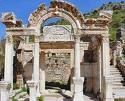
128 73.5-mi. Hadrian's Wall (begun 122) is completed, with milecastles every Roman mile, and 17 forts garrisoned by 5K cavalry and 13K infantry; ironically, the wall is rarely needed for a defense line and instead becomes a series of produce markets and custom posts for traders on both sides until the Romans leave Britain in the 4th cent. - like any border town, a nice place to get some Vitamin P? Emperor (since 70) Keikou of Yamato transfers his palace from Makimuku (Yamato) to Shiga (Omi) next to Kyoto Prefecture. Eunuch Sun Cheng returns to the Chinese capital, but never gets anywhere in attempting to reform all the bad eunuchs running the govt. into the ground. Roman consuls: Lucius Nonius Calpurnius Asprenatus Torquatus and Marcus Annius Libo. Architecture: Hadrian visits Ephesus, and orders the building of Hadrian's Temple in his own honor there (finished in 138).
129 The 227th Olympiad. Osroes I dies, and Vologases III becomes sole claimant to the Parthian throne. Roman consuls: Publius Juventius Celsus and Titus Auphidius Goenius Severianus. Births: Greek physician-surgeon-philosopher (in Rome) Galen (Aelius Galenus) (Claudius Galenus) (Galen of Pergamon) (Gk. "Galen" = healer) (d. 201) (d. 200-216?) on Sept. 22 in Pergamum, Mysia, Anatolia (modern-day Bergama, Turkey); son of wealthy architect Nicon; moves to Rome in 162, becomes Marcus Aurelius' physician in 164, returns to Pergamum in 166, and returns to Rome for good in 169, performing animal dissections and employing 20 scribes to write down his works.

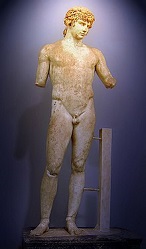
130 On Aug. 29 bearded bi Roman emperor (117-38) Hadrian (Publius Aelius Hadrianus) (76-138) visits Egypt, restoring Pompey the Great's tomb in Pelusium and offering a sacrifice to him and composing an epigraph for his tomb; in Oct. Hadrian and his Bythinian-born Greek male lover Antinous (b. 110) go lion hunting in the Libyan desert; too bad, Antinous drowns in the Nile, and Hadrian has him deified, and on Oct. 30 has the city of Antinoopolis built on the spot, which lasts for five cents. - don't talk there with your mouth full? On Nov. 7 emperor (since 70) Keikou (b. -17) dies dies at age 146, and Seimu (-191) becomes Japanese Yamato emperor #13 (until 191). On Nov. 21 after continuing down the Nile to Thebes, Hadrian visits the Colossi of Memnon, then heads N, reaching Fayyum on Dec. 1. Approx. date of the 5-vol. Exposition of the Oracles of the Lord of St. Papias. Approx. date (70-132?) of the Christian Epistle of Barnabas, written in Greek, claiming that the Jews never were the chosen people of God, only Christians?; "More anti-Jewish than anything that did make it into the New Testament." (Bart D. Ehrman) About this time Aquila of Sinope (Pontus), a Roman who converted to Christianity then to Judaism, and became a disciple of Rabbi Akiva compiles a literal Greek Old Testament trans. in Jabneh (Jamnia) that is preferred by many Jews to the Septuagint, which the pesky Christians claim contains numerous prophecies of their Savior Jesus Christ. Roman consuls: Quintus Fabius Catullinus and Marcus Flavius Aprus. Births: Roman gen. Gaius Avidius Cassius (d. 175) in Cyrrhus, Syria; son of orator Gaius Avidius Heliodorus. Roman empress consort (161-75) Annia Galeria Faustina Minor (the Younger) (d. 176) on Sept. 21 in Rome; daughter of Emperor Antoninus Pius and Faustina the Elder. Roman Christian bishop (of Lyons) (177-202) (St.) Irenaeus (Gr. "peacemaker") (d. 202) in Smyrna (modern-day Izmir, Turkey); raised in a Christian family; pupil of bishop Polycarp of Smyrna; gives the four Gospels their names and fights Gnostics like Marcion?; feast day: June 28/Aug. 23. Deaths: Roman empress Domitia Longina (b. 53). Greek mathematician-geographer Marinus of Tyre (b. 70); dies after founding mathematical geography, paving the way for Claudius Ptolemy. Greek mathematician-astronomer Menelaus of Alexandria (b. 70); leaves Sphaerica (3 vols.); introduces the concept of a spherical triangle, and recognizes geodesics on a curved surface as analogs of straight lines. Japanese Yamato emperor #12 (70-130) Keikou (b. -17) on Nov. 7; dies at age 146 - what is it, the water or the poon?

131 Roman census. Roman laws and legal procedures are codified by imperial jurist Salvius Julianus (Lucius Octavius Cornelius Publius Salvius Julianus Aemilianus) (100-169) under Hadrian's orders in the Praetorian Edict, which no praetor could thereafter alter, ending the extension of legal procedure by praetorian formulae; senatorial decrees become only a confirmation of the imperial speech (oratio principis), and the emperor's edicts become the only source of law; wasting no time, Hadrian isssues edicts aimed at making Jews give up their primitive religion, incl. banning the barbaric practice of circumcision, the ordination of rabbis, the teaching of the Torah, and public Jewish meetings, pissing-off the Jews and fomenting rebellion. Sextus Julius Severus becomes Roman gov. of Britain #20 (until 133). Roman consuls: Marcus Servius Octavius Lenatus Pontianus and Marcus Antonius Rufinus.




132 Roman emperor (117-38) Hadrian (76-138) visits ruined Jerusalem, announcing plans to rebuild and Romanize the city, dedicating it to the pagan Roman gods Jupiter, Juno, and Minerva, and building shrines all over the city dedicated to them, pissing-off the Jewish pop. and fomenting rebellion; worst of all, he begins to construct a Temple of Jupiter Capitolinus in Jerusalem on the site of the ruined Jewish Temple of Jehovah, center of everything that is Jewish, with a dangly statue of a naked man-god showing everything Jehovah detests, pissing-off the religious Jewish minority bigtime and making them launch an all-out war to expel the hated Romans in the last-ditch Bar Kokhba (Kochba) (Cocheba) Uprising (ends spring 136) against Rome in Judea led by Simon (Shimon) Bar Kokhba (Kochba) (Cocheba) (-135) (Heb. "Son of a Star") (real name Bar/Ben Kosiba or Kozebah) and his maternal uncle Eleazar the Priest of Modi'im, which begins with 200K Jewish guerrilla fighters stirring up the countyside and taking over Judea until the Tenth Legion guarding Jerusalem leaves to fight them then occupying Jerusalem, setting up an independent nation and hoping to rebuild the Temple of Jerusalem free of goy gods while reinstituting Jewish ceremonies; half-mad Simon orders young recuits to chop off a finger, with the soundbyte: "O Master of the Universe, there is no need for you to assist us, but do not embarrass us either"; the old fortress of Herodium near Bethlehem is briefly reoccupied; Bar Kokhba overstamps Roman coins to make Jewish ones bearing the legends "Simon the Prince" and "Eleazar the Priest"; pissed-off Hadrian decides to make an example of the pesky Jews and sends 12 divs. from as far away as Britain to totally wipe them out of Judea, along with his best generals, led by troubleshooter gen. Sextus Julius Severus (gov. of Britain in 131-3); meanwhile Bar Kochba's rebels are only a minority of the Jewish pop., who seem to have been getting along with the Romans and just wanted to make money and live the good life?; too bad, Hadrian was one of Rome's greatest emperors, the kind who never lost a battle, and his troops kick the Jews' butts bigtime; After being talked out of drawing lots to let the gods decide, 19-y.-o. Chinese Han emperor Shun Di picks his 16-y-o. consort Liang Na (Shunlie) (Chin. "kind and achieving") (116-50) as empress, who goes on to earn a good rep. Roman consuls: Gaius Junius Serius Augurinus and ? Trebius Sergianus. Inventions: Zhang (Chang) Heng (78-139) of China invents the first Seismograph, a bronze urn with dragon mouths that drop a ball in the direction of the earthquake into the mouth of a bronze frog.
133 The 228th Olympiad. Roman consuls: Marcus Antonius Giber and Publius Mummius Sisenna. Sextus Julius Severus is transferred from Britain to Judaea to suppress the Bar Kochba Revolt, becoming the first top gen. sent by Hadrian, according to Cassius Dio; Roman consul Publius Mummius Sisenna becomes Roman gov. of Britain #21 (until 138), going on to finish Hadrian's Wall. Births: Greek Christian convert apologist Athenagoras of Athens (d. 190) in Athens; converts from Platonism to Christianity?; feast day: July 24.
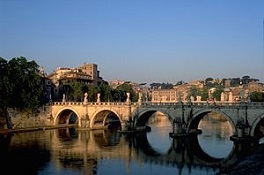
134 Architecture: The Aelian Bridge (Pons Aelius) (Ponte Sant'Angelo) is built by Roman emperor Hadrian to span the Tiber River from the center of Rome to his new mausoleum, which becomes Castel Sant'Angelo.
Roman consuls: Lucius Julius Ursus Servianus and Titus Vibius Varus.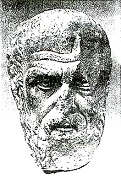

135 The Romans mop up the Jewish rebels, killing 580K (half the pop.), and destroying 985 towns and villages and 50 fortresses; on Tish B'av (9th Ave) after a 3-1/2-year siege by the Roman Legio V Macedonica and Legio XI Claudia et al. , which drove him out of Jerusalem, Simon is KIA in the Judean highland fortress of Betar (Bethar) (Beitar) SW of Jerusalem after Eleazar the Priest is framed by a double agent Samaritan on treason and he kicks him to death, causing a heavenly voice (bat koi) to announce his imminent doom,; the fortress is destroyed and the entire pop. massacred except one Jewish youth, after which "their horses were submerged in blood to their nostrils"; Hadrian prevents the bodies from being buried, after which they allegedly miraculously fail to decompose until Hadrian's successor Antoninus Pius permits them a decent burial; after too heavy Roman casualties, Hadrian reports the big V to the Senate sans the customary greeting "I am well and the army is well"; Hadrian issues an edict banning Jews from Judea and the city of Jerualem except on the 9th of Av (Tisha B'Av) in July or Aug. until the 7th cent., completing the Jewish Diaspora (Heb. "Tefutzah" = scattered), the dispersion of the pesky oddball square-peg-in-a-round-hole Jews throughout the Roman Empire, creating the Wandering Jew, with a few clumps of Jews remaining in Galilee, Sepphoris, and Tiberias; Judea is renamed Syria-Palestina (coined by Herodotus), and the way is now clear for the spreading of the name Jah-Zeus (Jehovah-Zeus) (Jesus) by the empire-wide Catholic (universal, as in get all the pagans to join the Church no matter how much the original faith has to be diluted) conspiracy, when his real name was real name was Yeshua, and being too Jewish it's now un-PC; his real name was Chrestos and there was a later coverup?; Christians are banned until emperor Constantine I declares Christianity the official religion in 313; the name sticks until 324-5; Rabbi Akiva ben Joseph (50-135) is executed by the Romans after teaching the Torah in public after the revolt, leaving Sepher Yetsirah (Sefer Yezira) (Book of Creation), which goes with the Sepher Hazzohar (Book of Brightness) (Dan. 12:3) of his contemporary Simeon bar Jochai (Yochai), and teaches the mystical pantheistic Qabala (Qabbala) (Kabbala) (Kabbalah) (Cabala) (Cabbala) (Heb. "to receive, welcome"), in which there is no Creation, and Nature is due to the self-development of Adam Kadmon (first or ideal man), who is the absolute being God, who created the Universe via the 10 Sefiroth (numbers or principles), incl. the Spirit of God, the emanations of air, water, and fire, three spatial dimensions to the left, and three to the right; the 22 letters of the Hebrew alphabet determine the forms through which Creation can be understood by the human mind; its mystical numerology intrigues and undermines mystics, philosophers, and scientists until ? - man does not live by bread alone but by every word of whom? The Dong Han Chinese govt. permits eunuch marquesses to pass their marches to their adopted sons; meanwhile Liang Na's father Liang Shang, Marquess of Chengshi (-141) becomes CIC of the armed forces, beginning the rise of the Liang family. The Apocalypse of Peter, the document responsible for the Christian doctrine of punishments in Hell is written about this time? Roman consuls: Lucius Tutilius Luprecus Pontianus and Publius Calpurnius Atilianus Rufus. Deaths: Jewish rabbi Akiba ben Joseph (b. 50) (d. 137?); leaves Sepher Yetzirah (Yasirah) (Book of Creation or Formation), which goes with the Sepher ha-Zohar (Hazzohar) (Book of Splendor or Brightness) (Dan. 12:3) of his contemporary Simeon bar Jochai (AKA Rashbi and Rabbi Shimon), and teaches the mystical pantheistic Qabala (Qabbala) (Kabbala) (Kabbalah) (Cabala) (Cabbala) (Heb. "to receive, welcome"), in which there is no Creation, and Nature is due to the self-development of Adam Kadmon (first or ideal man), who is the absolute being God, who created the Universe via the 10 Sefiroth (numbers or principles), incl. the Spirit of God, the emanations of air, water, and fire, three spatial dimensions to the left, and three to the right; the 22 letters of the Hebrew alphabet determine the forms through which Creation can be understood by the human mind; its mystical numerology intrigues and undermines mystics, philosophers, and scientists until ? - man does not live by bread alone but by every word of whom? Greek philosopher Epictetus (b. 55) in Nicopolis, Greece; after he dies his lamp is purchased by an admirer for 3K drachmae; leaves Discourses of Epictetus (8 vols.), collected by his pupil Arrian of Nicomedia (86-161), which teach that philosophy is a way of life, and that fate determines events, hence we should accept life calmly, exercising rigorous self-discipline, making fans of Marcus Aurelius, U.S. fighter pilot James Stockdale et al.; also leaves The Enchiridion (Gr. "dagger") (small handbook); "Practice yourself, for heaven's sake, in little things, and thence proceed to greater"; "All religions must be tolerated... for... every man must get to heaven in his own way": "Happiness and freedom begin with a clear understanding of one principle: Some things are within your control, and some things aren't"; "It's not what happens to you, but how you react to it that matters"; "We are disturbed not by what happens to us, but by our thoughts about what happens"; "Make the best use of what is in your power, and take the rest as it happens"; "Know first who you are, then adorn yourself accordingly"; "It is impossible for a man to learn what he thinks he already knows"; "First say to yourself what you would be, then do what you have to do"; "The less the fun the more pleasant it is"; "There is only one way to happiness and that is to cease worrying about things which are beyond the power of our will"; "We have two ears and one mouth so that we can listen twice as much as we speak"; "The key is to keep company only with people who uplift you, whose presence calls forth your best"; "Remember that no one offends you; it's your subjective opinion, nothing else"; "He is a wise man who does not grieve for the things which he has not, but rejoices for those which he had"; "To accuse others for one's own misfortune is a sign of want of education. To accuse oneself shows that one's education has begun. To accuse neither oneself nor others shows that one's education is complete"; "Is freedom anything else than the right to live as we wish? Nothing else"; "Everything, saith Epictetus, hath two handles - the one to be held by, the other not" (Robert Burton). Chinese Taoist empress Dou (Xiaowen) (b. ?); wife of Emperor Wen Di; mother of Emperor Jing Di.

136 Govt. corruption causes a number of rebellions in S China (until 138); many rebel gens. surrender willingly if the corrupt officials are replaced by Shung Di. Telesphorus is martyred, and Athenian Greek (St.) Hyginus (d. 140) is elected bishop of Rome (pope #9); he hygenically formalizes the hierarchy and its privileges, orders that all churches be consecrated, and institutes the use of godparents at baptism. Roman consuls: Lucius Aelius Cejonius Commodus and Sextus Vettulenus Civica Pompeianus.
137 Amid mass whining, whooping, and hollering Emperor Hadrian finishes Romanizing Big J and renames Jerusalem to Colonia Aelia Capitolina, dedicated to Jupiter Capitolinus and rebuilt in Roman style, pissing-off the Jews, who don't want a repeat of the Antiochus IV Epiphanes fiasco; Hadrian builds the triple Ecce Homo Arch near the Struthion Pool as the entrance to the E forum, named after Pontius Pilate's speech in John 19:13 after a game is discovered in 1864 etched on a flagstone of the pool that allegedly was played by Roman soldiers before executing Jesus; Golgotha is covered with dirt and a temple to Venus is built on top in an attempt to squelch the pesky Christian religion; not phased, the bishop of Rome orders that the birthday of Mithra, er, Christ, i.e., Christmas be celebrated as a solemn feast, although it isn't ordered to be observed on Dec. 25 until 350 in order to take over the celebration of the Brumalis winter solstice celebration from the worshipers of Mithra and the celebration of Saturnalia (rebirth of the Sun) from the cootie-queen pagans; Hadrian renames the entire Iudaea Province to Syria Palaestina, after the Phoenicians or Philistines, as originally coined by ancient Greek historian Herodotus, in an attempt to de-Judaize the country permanently, which is now used by Saudi-financed anti-Israel propagandists to actually deny that Jews ever lived there; too bad, he didn't know that Jews don't get mad they get even, so maybe he doomed the Roman Empire right there, inducing them to finally launch the wildass Arabs at it after inventing a new nutso killer religion for them, see TLW's Islam Historyscope; call it a coincidence that Hadrian, the Jews' most hated emperor, was the first to wear a beard, imagine their mixed feelings at Abe Lincoln later; the whole Jesus fable was invented at this point to get even with the Romans, with the destruction of the Jewish Temple in 70 C.E. used as a blind screen so that later historyscopers would scope in vain 60 years too early? The Ebionites (Heb. "ebyon" = poor) sect of Jewish Christians who deny the divinity of Christ and consider St. Paul an apostate for declaring the supremacy of Christian teaching over the Mosaic Law head W across the Jordan River into Peraea (modern-day Jordan), isolating themselves from the main body of Christians and adopting a conservative Pharisaic creed that evolves into a combo of Christianity, Gnosticism, and Essenism, and split into groups who believe or reject the Virgin Birth; too bad, they die out by the 5th cent.; in 1960-1 Yigael Yadin (1917-84) excavates the Cave of Letters in the desert W of the Dead Sea, discovering a basket at the bottom of a privy containing 19 bronze items, which are now housed in the Shrine of the Book near Givat Ram in W Jerusalem, incl. a patera (libation dish) with an engraving of the Greek-Roman goddess Thetis, mother of Achilles, causing speculation as to whether these are sacred objects from the Temple of Jehovah (destroyed in 70); a purse containing the 35 Papers of Babatha, a woman who owned a date orchard in En-Geddi on the W shore of the Dead Sea is found, incl. dated orders by Bar Kokhba, showing him as a meany who threatened and ordered the arrest of fellow Jews. Comparison of C-14 dates caused Magen Broshi to propose Broshi's Law that the oldest extreme of the C-14 date range is the most accurate; bones of starved women and children are later found, along with remnants of a Roman army outpost on top of the mountain; for the perfect burger with fries, Cochin (Malabar) in SW India became a haven for Jews until modern times; the Diaspora didn't really happen, and modern Muslim Palestinians are their descendants? 229th Olympiad. Roman consuls: Lucius Aelius Cejonius Commodus and Publius Celius Balbinus Vibullius Pius. Births: Roman emperor (193) Marcus Didius Salvius Julianus Severus (d. 193); buys the purple.


138 On July 10 Roman emperor (since Aug. 10, 117) Hadrian (b. 76), after having kicked dirt in the faces of Jehovah and the pope, and seeing his first choice for successor Lucius Ceionius Commodus die, kicks the bucket himself in his villa in Baiae, and is succeeded as Roman emperor #15 (until 161) by hand-picked (Feb. 25) (#4 of the Five Good Emperors) Antoninus Pius (Titus Aurelius Fulvius Boionius Arrius Antoninus Pius) (86-161), who takes the imperial name Imperator Titus Aelius Caesar Antoninus; he adopts the young son of Lucius Ceionius Commodus, Lucius Aelius Aurelius Commodus (henceforth called Lucius Aurelius Verus), along with philosophic Marcus Annius Verus (henceforth called Marcus Aurelius Verus Antoninus). Numidian (Algerian) native (son of a Libyan Berber landowner) (white?) Quintus Lollius Urbicus (101-151), veteran of the Bar Kochba Revolt and former gov. of Germania Inferior is appointed by Antoninus Pius as Roman gov. of Britain #22 (until 142), with orders to forget Hadrian's containment policy and begin the reconquest of Lower Scotland N of Hadrian's Wall, which he begins in Corbridge in Northumberland behind Hadrian's Wall, striking NNW on Dere Street towards the Firth of Forth with his Legion II Augusta, taking on the Dumnonii tribe of South Strathclyde, and the British Votadini (Guotodiri) (Gododdin) tribe between Hadrian's Wall and the Antonine Wall. A eunuch conspiracy against Shun Di is discovered, and Liang Shang intercedes to advocate leniency. The Jewish Sanhedrin moves from Jamneh to Usha in Galilee, going on to do it 2x. Alexandrian Gnostic Basilides flourishes, leaving his Exigetica, which refers to the Gospel stories of the Sermon on the Mount and the Rich Man and Lazarus, yet denies the reality of the body of Jesus. Roman consuls: Canus Junius Niger and Gaius Pomponius Camerinus. Inventions: Chinese Eastern Han scholar Ma Rong (Ma Jung) (Jichang) (79-166) invents the device of double-column commentary, becoming the first use of footnotes - am I wrong, check my footnotes? Deaths: ROman emperor (117-38) Hadrian (b. 76) on July 10 in Baiae.

139 Hyginus becomes the first bishop of Rome to adopt the title of Papa (Pope), but is laughed off; the title of papa is applied to all bishops until 425? Manu VII dies, and his son Manu VIII (-163) becomes king of Edessa. Quintus Lollius Urbicus rebuilds the Roman fort at Corbridge, and fights a revolt by the Brigantes in N England and S Scotland (ends 142). The sheep-herding Qiang (ancestors of the Tibetans) begin a revolt against the Han Dynasty. Roman consuls: Titus Aelius Hadrianus Antoninus Pius and Gaius Bruttius Presens. Deaths: Chinese astronomer Zhang Heng (b. 78).



140 Roman consuls: Titus Aelius Hadrianus Antoninus Pius and Marcus Aelius Aurelius Verus. Mithradates IV vies for the Parthian throne. St. Hyginus dies a martyr, and (St.) Pius I (d. 155) is elected bishop of Rome (pope #10), becoming the first to use the word "Mass" - the pious like their Mass? Kanishka dies, and Huvishka I (-180) becomes king of Kushan (until 180), going on to subdue the city of Mathura. Births: Chinese physician Hua Tuo (Yuanhua) (d. 208). Deaths: Roman satirical poet Juvenal (b. 60); leaves Satires (5 vols.), 16 satires which speak of "bread and circuses" as keeping common Romans happy (10.81), say that men should pray for a "sound mind in a sound body" (10.356), that a perfect wife is a "rare bird" (6.165), and asks "Who will watch the watchers?" (6.347-8); "Back from when Deucalion climbed a mountain in a boat as the clouds lifted the waters, and then asked for an oracle, and then little by little spirit warmed the soft stones and Pyrrha showed maidens in Nature's garb to men, whatever men do – prayer, fear, rage, pleasure, joy, running about – is the grist of my little book" (Satire 1); "It is hard not to write Satire. For who is so tolerant of the unjust City, so steeled, that he can restrain himself" (Satire 1); "It is to be prayed that the mind be sound in a sound body. Ask for a brave soul that lacks the fear of death, which places the length of life last among nature's blessings, which is able to bear whatever kind of sufferings, does not know anger, lusts for nothing, and believes the hardships and savage labors of Hercules better than the satisfactions, feasts, and featherbed of an Eastern king. I will reveal what you are able to give yourself; For certain, the one footpath of a tranquil life lies through virtue." (Satire 10) Christian bishop St. Papias (b. 66) of Smyrna. Roman writer Suetonius (b. 69); leaves De Vita Caesarum (Lives of the Caesars) (The Twelve Caesars), and Divus Claudius, which contains the famous soundbyte: "Since the Jews constantly made disturbances at the instigation of Chrestus, he expelled them from Rome."
141 The 230th Olympiad. Roman consuls: Titus Goenius Severus and Marcus Peduceus Stloga Priscinus. The Qiang defeat a Han force led by Ma Xian and set fire to the tomb gardens of Western Han emperors in the Chang'an area; meanwhile Liang Shang dies, and his mean corrupt son Liang Ji (-159) gets his job of Han army CIC, plotting to get it all.

142 Pope Hyginus dies. The 142 C.E. Earthquake (141?) causes a tsnumari that destroys the Roman provinces of Lycia and Caria, along with the islands of Rhodes, Kos, Simo, and Serifos incl. the Greek city of Camirus in SW Asia Minor for the 2nd time (first in -226). Roman gov. of Britain Quintus Lollius Urbicus issues coins celebrating his big V over the Brigantes in Britain after defeating them with Legio II Augusta and reoccupying S Scotland; meanwhile on orders of Emperor Antninus Pius, the 39-mi. 10-ft.-high 16-ft.-wide turf-timber Antonine Wall (Forth-Clyde Rampart) in Caledonia 100 mi. N of Hadrian's Wall on the narrow neck of land from Bo'ness, from Falkirk ("variegated church") on the Firth of Forth to Old Kilpatrick in West Dunbartonshire on the Firth of Clyde is begun by Quintus Lollius Urbicus as the new frontier, with 16 forts spaced at 2 mi. intervals linked by the Military Way; a deep ditch is built on the N side, along with a wooden palisade on top of the turf; it is finished in 154; too bad, it is is abandoned in 162, although the area between the two walls serves as a first-line defense area against the Picts for the duration of the Roman occupation, and becomes the turf of the Brythonic tribes, who act as buffer states with the slightly different Picts and Gaels; meanwhile Urbicus goes after the Novantae, the last lowland Pictish tribe, who hold the Dumfries and Galloway peninsula. Chang Tao Ling founds the Taoist T'ien Shih Tao (Way of the Heavenly Master) in S China (Szechwan Province). Roman consuls: Lucius Cuspius Pactumeus Rufinus and Lucius Statius Quadratus.
143 Roman consuls: Gaius Bellicius Flaccus Torquatus and Lucius Vibullius Hipparchus.

144 In July self-made Black Sea shipowner (2nd cent. Bill Gates?) Marcion of Sinope (85-160), who moved to Rome, gave a huge donation to the Church, and spent five years there studying, preaching, and writing, becoming an Apostle Paul fan, presents his new Marcionite Doctrine, showing how the bald contradictions between the gods of the Old and New Testaments, combined with Paul's statements that faith and not law saves, proves that the Old Testament Jehovah (El) (Israel) is really the Devil, and that the Old T should be thrown out, shocking the Roman Christians, who kick him out and refund his money, after which he compiles the first Canonical List of Scriptures (10 of Paul's 13 epistles, excluding the "pastoral" epistles 1 & 2 Timothy and Titus), plus the Gospel of Luke, with all references to Jehovah and the Law edited out); after he is excommunicated by Pope Pius I, he founds his own Christian Marcionite sect, which lasts until the 5th cent.; this all causes the Church to work harder to fix its own NT canon. Han Shun Di (b. 115) dies, and his only son Prince Liu Bing (by Consort Yu) Chong (Chin. "young-ruling") Di (143-5) becomes Dong Han emperor #8 of China, with dowager empress Liang Na as regent; too bad, army CIC Liang Ji is trusted too much, giving him his big chance to do the quick step. Roman consuls: Lucius Lollianus Avitus and Titus Statilius Maximus. Deaths: Chinese Dong Han emperor #7 (126-44) Shun Di (b. 115).
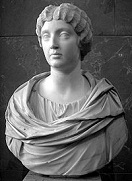

145 The 231st Olympiad. Roman census. Roman consuls: Titus Aelius Hadrianus Antoninus Pius and Marcus Aelius Aurelius Verus. Marcus Aurelius marries Antoninus Pius' daughter (by Faustina the Elder) Annia Galeria Faustina (Lat. "fortunate") the Younger (Minor) (130-76), and receives the imperial powers. Gnaeus Papirius Aelianus becomes Roman gov. of Britain #23 (until 147), continuing the occupation of Lowland Scotland. 3-y.-o. Chinese emperor Chong (b. 143) dies after reigning less than 6 mo., and his 7-y.-o. 3rd cousin Zhi (Chin. "upright") Di (138-46) becomes Dong Han emperor #9 of China (until 146). Greek philosopher-historian Gen. Arrian of Nicomedia (Lucius Flavius Arrianus "Xenophon") (86-161), pupil of Stoic philosopher Epictetus at Nicopolis, and former gov. of Cappadocia from 131-7 becomes archon of Athens (until 146). Births: Roman emperor #21 (193-211) Lucius Septimius Severus (d. 211) on Apr. 11 in Leptis Magna, Africa (modern-day Khoms, Libya).
146 In the summer Zhi Di (b. 138) is poisoned by Liang Ji for blinking at him and calling him "an arrogant general", giving him poisoned soup then refusing his request for water to ease the pain; he then pressures his sister, dowager empress Liang Na to make 14-y.-o. Liu Zhi, Marquess of Liwu (great-grandson of Zhang Di) (fiancee of Liang Ji's younger sister Lian Nuying) the new emperor, and on Aug. 1 he is crowned Huan (Chin. "diligent") Di (132-68), Dong Han emperor #10 (until 168). Roman consuls: Sextus Erucius Clarus and Gnaeus Claudius Severus Arabianus.

147 Vologases IV (-191), son of Vologases III becomes king of Parthia. Roman consuls: Gaius Prastina Pacatus Messallinus and Lucius Annius Largus.
148 The first translator of Buddhist texts into Chinese, a Parthian named An Shigao comes to Luoyang, staying for two decades. Roman consuls: Lucius Octavius Cornelius and Publius Salvius Julianus Aemilianus.
149 The 232nd Olympiad. Roman consuls: Servius Cornelius Scipio and Lucius Salvidienus Orphitus. Births: Japanese Yamato emperor #14 (192-200) Chuai (d. 200).
150 A Goth migration led by king Filimer moves SE from the lower Vistula River. Conarus (-164) becomes king of the Picts. Marthadum (-160) becomes the 31st and last king of Qataban in S Arabia. The first historical record of Christians in Edessa. In this half-cent. the Scythians occupy Sogdiana in C Asia between the Jaxartes and Oxus (Syr Darya and Amu Darya) Rivers). In this half-cent. the Jewish community in Alexandria becomes virtually extinct. About this time (150-250) Buddhist philosopher Nagarjuna founds the Madhyamika (Sans. "Middle Way") (Mahayana Buddhism) school in India. About this time the Mayans move their hub city from Izapa in S Yucatan to Edzna in the N; the Mayan New Year changes from Aug. 13 to July 26. About this time the writing of apologies (defenses of the faith) begins to become popular with Christians - cov, cov cover your tracks, cover your tracks, don't look back jack, cover your tracks? Nonfiction: The Shepherd of Hermas, the document responsible for Christian puritanism is written about this time in Rome? About this time The Ascension of Isaiah is written in Hebrew. Approx. date of The Gospel of Matthias, and The Protoevangelium of James. Justin Martyr writes his First Apology. Roman consuls: Marcus Gavius Squilla Gallicanus and Sextus Carminius Vetus. Births: Roman usurper emperor Decimus Clodius Albinus (d. 197) in Hadrumetum, N Africa 9modern-day Sousse, Tunisia). Greek Christian theologian (convert) Clement of Alexandria (Titus Flavius Clemens) (d. 215) in Athens; parents are wealthy pagans; teacher of Origen and Alexander of Jerusalem; feast day: Dec. 4/5. Indian Sautrantika school founder Kumaralabdha (d. 200). Deaths: Chinese Dong Han empress Liang Na (Shunlie) (b. 116).
151 Gothic king Filimer returns to Germania. Roman consuls: Sextus Quintilius Condianus and Sextus Quintilius Valerius Maximus. Deaths: Roman gen. Quintus Lollius Urbicus (b. 101).
152 Roman consuls: Manius Acilius Glabrio and Gnaeus Cornelius Severus.
153 The 233rd Olympiad. Roman consuls: Lucius Fulvius and Gaius Bruttius Presens.

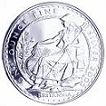
154 Former suffect consul Gnaeus Julius Verus becomes Roman gov. #24 of Britain (until 158), bringing troops from Germany and quelling a revolt by the Brigantes that had caused the Antonine Wall to be abandoned by 162 and a slaughter at the Roman fort at Newstead, going on to strip them of much of their territory; meanwhile the Romans under Antoninus Pius begin minting a bronze sestertius with a figure of Britannia, which is so cool that it is used on British coins for cents. after Rome falls. Roman consuls: Lucius Aelius Aurelius Commodus and Titus Sextius Lateranus. Births: Syrian Christian poet-scholar-philosopher (Father of Syriac Poetry) Bardesanes (Bardaisan) (d. 222) on July 11 in Edessa.
155 Peace is finally established S of Hadrian's Wall (the N boundary of the Roman province of Britannia) after a revolt is quelled; fighting continues N of the wall until the early 3rd cent. A short war between Rome and Vologesus of Parthia ends in an inconclusive peace. Gen. Zhang Huan suppresses a Hun rebellion in China. Roman consuls: Gaius Julius Severus and Marcus Junius Rufinus Sabinianus. Births: Chinese Dong Han warlord and chancellor Cao Cao (Mengde) of Wei (d. 220) in Qiao, Peiguo (Bozhou, Anhui); son of Cao Teng, foster son of a favorite eunuch of Huan Di. Roman historian-politician Lucius Claudius Cassius Dio (Dion) Cocceianus (d. 235) of Nicea, Bythinia; maternal grandson of Dion Chrysostomus (40-112). African Berber Christian theologian Tertullian (Quintus Septimius Florens Tertullianus) (d. 240) in Carthage; starts out a follower of Montanus; inventor of the Christian doctrine of an eternal Hell? Deaths: Roman Gnostic Valentinus (b. 100) in Rome or Cyprus. Pope St. Pius I (martyred).

156 Open your case? Christian nutcase prophet Montanus (135-177?) of Phrygia declares himself to be the "Spirit of Truth" (the personification of the Holy Spirit in the Gospel of John), and gathers a bunch of followers, incl. Prisca (Priescilla) and Maximilla, a pair of "prophetesses", who have holy visions and ecstasies from Lesbos, er, God, and begin preaching the "Third Testament" and the "New Jerusalem", which will descend from heaven to Montanus' home town of Pepuza, WC Phrygia, causing true blue believers to flock there; Carthage-born Berber Tertullian (Quintus Septimius Florens Tertullianus) (155-240 becomes a convert, going on to become the first Christian to produce a large corpus of Latin Christian lit. and defend against heresies incl. Gnosticism, becoming known as "the father of Latin Christianity". Roman consuls: Marcus Ceionius Silvanus and Gaius Serius Augurinus. Architecture: The Church of St. Peter upon Cornhill is founded in London, England at the city's highest point, allegedly on a site where St. Peter preached, becoming the seat of an archbishop until the coming of the pesky pagan Saxons in the 5th cent. causes London to be abandoned, and Canterbury to become the seat of an archbishop in the 6th cent. Deaths: Christian bishop St. Polycarp (b. 69) of Smyrna (modern-day Izmir) (seaport in W Asia Minor N of Ephesus at the crossroads of Asia and Europe, with the biggest agora in the Roman world) is martyred by the Romans in the stadium after he refuses to burn incense to the emperor and repeat "Caesar is Lord", saying, "86 years I have served Christ and he never did me any wrong. How can I deny my king who saved me?"; after a voice from heaven says "Be strong, Polycarp, play the man", he insists on being tied not nailed to a stake, and they burn him, but he supposedly remains untouched, so they use a sword on him, and his blood puts out the fire, causing martyrdom to become PC among Christians, generating thousands of willing new martyrs; he leaves the 14-chap. Epistle to the Philippians, about a case of embezzlement of church funds, which quotes a hundred earlier Christian writings and only a dozen Hebrew scriptures, and refers to Paul's Epistle to the Ephesians as scripture?; The Martyrdom of Polycarp becomes a bestseller, causing martyrologies to take their place alongside apologies as a favorite Christian writing pastime?

157 The 234th Olympiad. (St.) Anicetus (d. 166) is elected bishop of Rome (pope #11); he decrees that priests should not have long hair - like Jesus? Roman consuls: Marcus Ceionius Civica Barbarus and Marcus Metilius Aquilius Regulus Nepos Volusius Torquatus Frontonus.
158 The Huns and neighboring tribes invade China - which is more surprising, moving in or moving on? Longinus (Longus) (Lentulus) (partial name) becomes Roman gov. #25 of Britain (until 161). Roman consuls: Sextus Sulpicius Tertullus and Quintus Tineus Sacerdotus Clemens.

159 Roman census. Huan Di overthrows and kills army CIC Liang Ji, and eliminates the pesky Liang family, but has to use the help of the guess-who eunuchs, making them into bigger nutless wonders than ever. Greek physician Galen (Claudius Galenus) (Gk. "healer") (129-201) is appointed to the gymnasium attached to the Temple of Asclepius in Pergamum, Mysia (modern-day Bergama, Turkey), where he does animal (not human) dissections and goes on to establish that arteries carry blood and not air, and that blood is created in the liver, first using the pulse as a diagnostic tool; he elaborates on Hippocrates' vital humor theory that the body contains four vital fluids or humors (blood, yellow bile, black bile, phlegm), and that disease is due to an imbalance, pioneering the use of ligatures and becoming known as "the king of the catgut suture", viewing pus as beneficial; he views cancer as a result of melancholia caused by an excess of black bile, proven by its frequent occurrence in postmenopausal females, recommending surgical excision of a cancerous breast through healthy tissue to make sure that not "a single root" is left behind, discouraging ligatures and cautery to allow drainage of black bile. Polycrates of Ephesus visits Rome to confer with Pope Anicetus on the subject of the date of Easter, pushing the Jewish Passover (14th of Nisan) rather than Sunday, the day of the Resurrection. Roman consuls: ? Plautius Quintillus and Marcus Statius Priscus Licinius Italicus.


160 Architecture: Rich Greek rhetorician Atticus Herodes builds the Theater of Atticus Herodes. Roman consuls: Appius Annius Atilius Bradua and Titus Clodius Vibius Varus. Births: Roman Libyan Christian traveler-historian and bishop of Emmaus Sextus Julius Africanus (d. 240) in Jerusalem. Deaths: Greek skeptical philosopher Favorinus of Arelate (b. 80); dies after having a philosophical argument with Emperor Hadrian, who silences him, after which he utters the soundbyte that it would be foolish to criticize the logic of the master of 30 legions; after hearing of the emperor's displeasure with him, the Athenians pull down his statue, causing him to utter the soundbyte that if Socrates also had a statue, he might have been spared the hemlock.


161 The 235th Olympiad. Roman consuls: Marcus Aurelius Antoninus and Lucius Aurelius Verus. On Mar. 7 Roman emperor (since July 11, 138) Antoninus Pius (b. 86) dies, and is succeeded by hand-picked Marcus Aurelius (Marcus Annius Aurelius Verus) (121-180) as Roman emperor #16 (until 180) (last of the Five Good Emperors, #12-#16); in 177 loyal to Hadrian's wishes, he promotes his adopted brother Lucius Aurelius Verus (Lucius Ceionius Commodus Verus) (Vero) (130-69) (eldest son of Lucius Aelius Caesar, first adopted son and heir to Hadrian) to co-emperor as Roman emperor #17 (until 169) (first time two Roman emperors share power?); during his reign Rome reaches its maximum extent of 3.5M sq. mi. with a pop. of 55M; too bad his reign is marred by natural disasters, insurrections, wars of conquest, and the gosh-darned plague? Marcus Statius Priscus Licinius Italicus, an equestrian decorated by Emperor Hadrian for service during the Bar Kokhba Rebellion who rose to gov. of Dacia in 157-8, consul in 159, and gov. of Moesia Superior (160-1) becomes Roman gov. #26 of Britain (until 163). Nonfiction: Roman jurist Gaius (110-), Institutiones (Institutes); a summary of Roman law later used by Emperor Justinian I in the Justinian Code; a palimpsest containing the ms. overwritten is discovered in Verona in 1816 by Barthold Georg Niebuhr. About this time Christian bishop Melito of Sardis (-180) in Lycia writes Apology for Christians, addressed to Marcus Aurelius, begging him "not overlook us in the midst of such lawless plundering by the mob"; he is a Quartodeciman (Fourteenther), observing Easter on the Jewish Passover date of 14 Nisan, along with Polycrates of Ephesus et al., writing The Passover and other works, which are destroyed after Easter observance is fixed on Sunday and they are declared heretics. Births: Roman emperor #18 (180-92) Lucius Aelius Marcus Aurelius Antoninus Commodus (d. 192) on Aug. 31 in ;Lanuvium (near Rome); son of Marcus Aurelius (121-80) and Faustina the Younger; first Roman emperor born to the purple- wishes he could have that one back? Chinese Shu Han emperor #1 (221-3) Liu Bei (Xuande) (d. 223) in Zhuozhuo, Hebei; model Confucian monarch of the "Romance of the Three Kingdoms" by Luo Guanzhong; descendant of Prince Liu Sheng (Jing of Zhongshan) (d. -113); grows up poor and rises via the warlord route. Deaths: Greek historian Arrian of Nicomedia (b. 86) in Athens; leaves The Anabasis of Alexander (Anabasis Alexandri) (most authoritative bio. of Alexander the Great), Indica (On India), about Alexander the Great's expedition to India in -336 to 323, and the voyage of his officer Nearchus from India to the Persian Gulf after his conquest of the Indus Valley; refers to Oman and the port city of Muscat (Arab. "moscha" = inflated hide) in the Gulf of Oman (modern-day pop. 1.2M); also leaves two books on his teacher Epictetus' philosophy. Roman emperor #15 (138-61) Antoninus Pius (b. 86) on Mar. 7.
162 A deluge of the Tiber River destroys a good portion of Rome, drowns cattle, and ruins fields, causing a devastating famine, after which a series of fires, earthquakes, and insect plagues cause the masses to question why the gods have allowed it all, leading to Roman govs. blaming the pesky Christians and issuing decrees. The Parthian War with Rome begins when the long-standing quarrel between Rome and the Armenians becomes violent, and the Parthians under Chosrhoes defeat the 4-legion Roman garrison under Roman gov. of Cappadocia Marcus Sedatius Severianus (of Gaul) at the 3-day Battle of Elegia in Cappadocia in E Turkey, causing Severianus to commit suicide, after which the Parthians occupy Syria, depose King Manu VIII, and install new puppet ruler Wael bar Sahru; Marcus Aurelius appoints his co-emperor Lucius Verus as cmdr. of the Roman troops in the E, and they counterattack while he souses himself up at Antioch with his low-born babe Panthea, sacking Artaxata. Roman consuls: Quintus Junius Rusticus and Lucius Titius Plautius Aquilinus.
163 Sextus Calpurnius Agricula, former gov. of Germania Superior in 158 becomes Roman gov. of Britain #27 (until 168), going on to suppress revolts in N Britain, rebuild the fort at Corbridge, and withdraw troops S towards Hadrian's Wall for defense; meanwhile the pesky natives damage the Roman forum in Viroconium Cornoviorum (Wroxeter), and burn most of Verulamium (SW of modern-day St. Albans). Roman consuls: Marcus Pontius Lelianus and Aulus Junius Pastorus Cesennius Sospitus.

164 In 164/5 the Great (Antonine) Plague Era (named after a Greek physician in Rome) (smallpox?) (measles?) begins in the Roman Empire (ends 180) when soldiers returning from the Parthian War bring it with them, killing 4M-7M, and depopulating towns from Persia to the Rhine River, becoming a turning point in the empire's fortunes; Greek physician (in Rome) Galen (Claudius Galenus) (Gk. "healer") (129-201), who moved from Pergamum to Rome in 162 becomes emperor Marcus Aurelius' physician, and coins the term "tumor" for cancer, from the Latin word "tymbos" for sepulchral mound; "The ancient world never recovered from the blow inflicted on it by the plague which visited it in the reign of M. Aurelius." (Barthold Georg Niebuhr) Seleucia on the Tigris River is destroyed by the Romans. Ethodius I (-197) becomes king of Scotland. Roman consuls: Marcus Pompeius Macrinus and Publius Juventius Celsus.


165 The 236th Olympiad. Roman consuls: Marcus Gavius Orphitus and Lucius Arrius Pudens. The Parthians are defeated by the Romans under Syrian-born Gen. Gaius Avidius Cassius (130-75); Seleucia and Ctesiphon are defeated, and Manu VIII is reinstated as a Roman puppet on the throne of Armenia; the Romans capture the frontier fortress of Dura Europos on the right bank of the Euphrates River in modern-day Salhiye, Syria (until 257). The Jewish Sanhedrin moves to Sepphoris (Shefaram), "the Ornament of Galilee" (until 180) - funny how they love to meet near where Jeezy Christy allegedly came from? Births: Roman emperor #24 (217-8) Marcus Opellius Macrinus (d. 218) in Caesarea, Mauretania (modern-day Cherchell, Algeria); first emperor who was not a senator or of a senatorial family, and first of Moorish descent. Deaths: Judean-born Christian apologist Justin Martyr (b. 100) in Rome (martyred); leaves apologies to the emperor, his sons, and the Roman senate, On the Resurrection, and Dialogue with the Jew Trypho, attempting to prove that Christianity is the new law for all. Roman writer Aulus Gellius (b. 123); leaves Attic Nights, incl. a revamping of Apion's lost story of Androcles and the Lion, about a 1st cent. C.E. slave of a Roman consul who is forced to fight in the Circus Maximus with a lion, and is spared because he had removed a thorn from its paw in Africa, and then is freed by the emperor, leading the lion around Rome.

166 Lucius Verus celebrates a triumph in Rome with Marcus Aurelius; too bad the returning Roman troops bring the plague with them, seriously weakening the frontier garrisons; the Christians later make the false claim that the entire empire is depopulated? German Astingi and Lacringi Vandals allied with Sarmatian Iazyges invade Dacia and kill Roman military gov. Calpurnius Proculus, causing Partian veteran legion Legio V Macedonica to be transferred from Moesia Inferior to Dacia Superior to counter them; meanwhile 6K German Gothic Langobardi and Lacringi invade Pannonia over the Danube River in two different areas, and are defeated by new Roman Dalmation legions Legio I Aiutrix under Gen. Candidus and Ala Ulpia Contrariorum under Gen. Vendix, causing military gov. of Pannonia Marcus Iallius Bassus to initiate negotiations with 11 tribes, with Marcromanni king Ballomar acting as mediator, resulting in a truce and a withdrawal from Roman territory without a permanent agreement; the Marcomannic War, a major revolt of the client peoples (who help protect the borders and provide soldiers for the Roman army) of the Chatti, Marcomanni, Quadi, Hermunduri, Jazyges, and Roxolani on the upper Rhine and Danube Rivers begins (ends 180), causing Marcus Aurelius and Lucius Verus to raise two Italian legions to fight them; the age of diplomacy with the northerners ends, and the "wandering of the nations" over the Danube River frontier into Roman territory begins, culminating in 476 C.E. with the dissolution of the Western Roman Empire; the days when it was cheap to defend the empire with an army of only about 300K soldiers ends, and the upper classes have to be taxed ever more to pay for the larger armies needed, although Marcus Aurelius is hesitant about it and it takes until Septimius Severus to become the way emperors do business? - what can be more romantic than Rome? Anicetus dies a martyr, and (St.) Soter (d. 175) is elected bishop of Rome (pope #12); he declares matrimony a sacrament only if blessed by a priest, and prohibits women from burning incense during the congregation of the faithful. Galen returns from Rome to Pergamum (until 169). Chinese univ. students protest govt. corruption and call on Huan Di to remove corrupt officials, but he instead orders their arrest; meanwhile the First Roman Embassy to China is sent along a sea route, and is greeted by Huan Di in Luoyang (2nd in 284) - the original Richard Nixon and Mao? Roman consuls: Quintus Servilius Pudens and Lucius (Aulus) Fufidius Pollio. Deaths: Chinese scholar Ma Rong (b. 79).
167 Plague grips Rome off and on for the next 10 years. Bishop Soter of Rome moves Easter from 14 Nisan (Jewish Passover) to the following Sunday, nixing the Quartodecimans. Roman consuls: Lucius Aurelius Verus and Marcus Ummidius Quadratus.

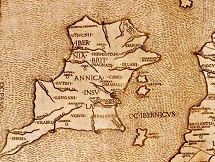
168 Co-emperors Marcus Aurelius and Lucius Verus chase the German Marcomanni into the Alps. Sextus Calpurnius Agricula leaves Britain to become gov. of Lower Moesia, and Parthian War vet Quintus Anistius Adventus (120-76) and former gov. of Germania Inferior becomes Roman gov. of Britain #28 (until 178). Huan Di (b. 132) dies, and 12-y.-o. Ling (Chin. "inattentive") Di (156-89), great-great-grandson of Zhang Di becomes Dong Han emperor #11 of China, with Dowager empress (Huan Di's 3rd wife) Dou Miao (Huansi) (Chin. "diligent and deep-thinking") (-172) as regent; too bad, her Confucian scholar father Dou Wu (-168) and fellow scholar Chen Fen (-168) attempt to curb the eunuchs and install Confucian scholars in govt. posts, and are defeated in battle and commit suicide, and the eunuchs dominate again, with Zhang Rang (-189) as leader of the Ten Eunuchs (Ten Regular Attendants). Roman consuls: Lucius Venuleus Apronianus Octavius and Lucius Sergius Paulus. Deaths: Egyptian-born Greek mathematician-astronomer-geographer Claudius Ptolemy (b. 90) n Alexandria, Egypt; leaves Almagest (Arab. "Great Compilation") (original title "Astronomical System"), a 13-vol. system of mathematical astronomy placing the Earth at the center of a static Universe, which is accepted by both the Christian and Muslim worlds until the Christian Renaissance; he also leaves Geography (Geographical Guidance), which incl. a map of the known world with coordinates given, incl. the oldest known map of Ireland, and The Tetrabiblos (Apotelesmatika), a comprehensive work on astrology that becomes a std. work for 1K years, arguing that it is a natural and beneficial study.
169 237th Olympiad. Early in the year Roman emperor (since Mar. 7, 161) Lucius Verus (b. 130) dies of an illness in Altinum (food poisoning? smallpox?) after wintering in Aquileia, and Golden Mark Marcus Aurelius raises his 8-y.-o. son Commodus to the rank of co-emperor; they go N to engage the Quadi and the (Suebian?) Marcomanni, suffering a major defeat as Pannonia is overrun, Rhaetia (Raetia), Noricum and Moesia are invaded, and Aquileia in Italy is sieged. Galen returns from Pergamum to Rome, staying for life as a big man in the Roman imperial court. Roman consuls: Quintus Pompeius Senecio Roscius Murena Celius and Marcus Aquilius. Births: Japanese empress (209-69) (201-69?) Jingu (d. 269); mother of Ojin (200-310). Deaths: Roman jurist Salvius Julianus (b. 100); leaves The Digesta (90 vols.); Edictum Perpetuum.
170 Roman consuls: Gaius (Sextus) Erucius Clarus and Marcus Gavius Cornelius Cetaegus. Dionysius is bishop of Corinth. About this time the School of Antioch is founded as a rival to the Catechetical School of Alexandria, pushing a more literal exegesis that emphasizes the difference between the human and divine in the person of Jesus Christ; students incl. Nestorius.
Rudradaman, grandson of Chashtana in Malwa erects a Sanskrit inscription at Girnar in Kathiawar recording repair of a dam which broke c. 150, and how they defeated northern tribesman and repeatedly routed the southern Satakani. Science: About this time Galen discovers the function of the arteries. Nonfiction: Lucian of Samosata (115-200), De Morte Peregrini (The Death of Peregrinus); satire of the Christians. Symmachus, Greek Trans. of the Hebrew Scriptures; by an Ebionite. About this time after traveling to Palestine and visiting the library in Caesarea Maritima, Melito of Sardis (-180) compiles the earliest known Christian Canon of the Old Testament, coining the term "canon". Births: Roman Christian bishop Hippolytus (d. 235) in Rome; bishop of Portus Romanus outside Rome; disciple of Irenaeus (disciple of Polycarp). Roman ruler Herodian (Herodianus) of Antioch (d. 240). Greek philosopher Lucius Flavius Philostratus (d. 244) Deaths: Lucius Apuleius; leaves The Golden Ass, the only Latin novel to survive whole - who only wants a half-ass?171 The Cimbri attack the Dacian frontier and are repelled. Roman consuls: Titus Statilius Severus and Lucius Alphidius Gerennianus.

172 The Marcomanni are finally defeated by the Romans, and the tide turns in the Romans' favor. After being expelled from the Christian church for his views, Justin Martyr's converted pagan pupil Tatian of Assyria (Syria) (of Adiabene) (120-80) closes his Christian school in Rome and returns to Arbela in Mesopotamia (modern-day Arbil in N Iraq), setting up the ascetic sect of the Encratites, rejecting worldly goods, meat, alcohol, and sex, and substituting water for wine in the Eucharist, setting himself up as an independent authority against Iraeneus, Clement of Alexandria, Hippolytus, and Origen, pissing them off and causing all but two of his works to be later destroyed; he denies that Adam was saved, pissing them off more; he writes the Diatessaron (a harmony of the four canonical Gospels, with no effort to hide inconsistencies), then trans. it into Syriac and brings it to Arbela with him; it becomes the std. text of the four Gospels in the Syriac-speaking churches until the four separate Gospels of the Peshitta version supplant it until the 5th cent. Roman consuls: Servius Calpurnius Scipio Orphitus and ? Quintilius Maximus.
173 The 238th Olympiad. Roman census. Roman consuls: Gnaeus Claudius Severus and Tiberius Claudius Pompeianus. Births: Roman emperor #27 (235-8) Gaius Julius Verus Maximinus Thrax (the Thracian) (d. 238) in Thrace (Moesia?); first barbarian emperor and first barracks (soldier) emperor, who never sets foot in Rome.
174 The Quadi are defeated after the incident of the Thundering Legion (Legio Fulminatrix), where a fortuitous rain comes in handy, ending the Marcomannic War (begun 167). Roman consuls: Lucius Aurelius Gallus and Qintus Volusius Flaccus Cornelianus.

175 In Apr. Roman Syrian legate Gen. Gaius Avidius Cassius (b. 130) revolts and is declared emperor in Syria and Egypt, but is murdered in July after reigning 3 mo. A regiment of 5.5K Sarmatian cavalry troops arrive in Britain to help hold the Roman forts. Soter dies a martyr, and (St.) Eleutherius (-189) (a Greek) is elected bishop of Rome (pope #13), abolishing the observance of Jewish kosher food customs - treyf is cool, time for some bacon and eggs, ham, perhaps a little blood pudding? Christianity is introduced into the British Isles by King Lucius or Eleutherius, bishop of Rome? Roman consuls: Lucius Calpurnius Piso and Publius Salvius Julianus. Nonfiction: About this time Christian Gnostic Heracleon writes Commentary on the Gospel of John, the first known Christian commentary on the Gospels. About this time Papyrus 46, the earliest ms. of the Greek New Testament to survive to modern times incl. most of St. Paul's epistles is written (175-225). Deaths: Roman gen. Gaius Avidius Cassius (b. 130) in July.
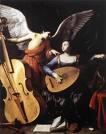

176 Roman consuls: Titus Pomponius Proculus Vitrasius Pollio and Macrus Flavius Aprus. A triumph is held in Rome for Marcus Aurelius and Commodus. Architecture: The Aurelian Column is erected. Deaths: Roman empress consort (161-75) Faustina the Younger (b. 130) in spring in Halala, Cappadocia Roman Christian martyr St. Cecilia (Lat. "blind") (b. ?) in Sicily; a noblewoman who was martyred with her husband Valerian(us) and his brother Tiburtius, singing to God as she dies, becoming the patron saint of musicians and church music; feast day: Nov. 22.


177 The 239th Olympiad. Marcus Aurelius' 15-y.-o. son Commodus becomes Augustus and co-ruler with his philosophic but indulgent pa. Manu VIII dies, and Abgar VIII (the Great) (-212) becomes king of Edessa (Osroene), turning it into the "Athens of the East" before converting to Christianity about 200 C.E. In the reign of Marcus Aurelius slave girl (St.) Blandina (Lat. "seductive") of Lyons is allegedly gored to death by a bull, becoming a Christian martyr. They worship the Marlboro Man? Smyrna-born (St.) Irenaeus (130-202) is appointed bishop of Lugdunum (Lyons) to attempt the conversion of the Druidic Gauls, and goes to Rome to plead with Eleutherius to deal with the ascetic Montanist movement in Phrygia, which extols virginity, uses Hebrews 6:4-6 to claim that sins committed after baptism cannot be forgiven, and whose prophets go into ecstasy and speak with God's voice in the first person, claiming to supersede the Gospels, which later turns on Romanized Carthaginian Tertullian (160-230), who becomes a Montanist and writes De Ecstasi; followers of Eastern Christianity are driven across the English Channel during the persecutions of Lyons, carrying it with them and founding the Celtic Church in Britain, which takes until 1172 to conform with the Roman Catholic Church in rites and ceremonies (664 in England, 1153 in Scotland and Ireland). Roman consuls: Lucius Aelius Aurelius Commodus Antoninus and Marcus Peduceus Plautinus Quintillus. Deaths: Greek rhetorician Herodes Atticus (b. 101).

178 Roman consuls: Servius Cornelius Scipio Salvidienus Orphitus and Decimus Velius Rufus Julianus. Marcus Aurelius and Commodus set off for the Danube frontier again in an effort to create the new Roman provinces of Marcomannia and Sarmatia. Caerellius Priscus becomes Roman gov. of Britain #29 (until 180). Nonfiction: Roman Platonist philosopher Celsus writes On the True Doctrine (Word), a bestselling critical demolition of Christianity, turning up the heat by several deg. Celsius, claiming that it is a dangerous religion for illiterate fools, adolescent boys, and slaves recruited in the marketplace, and should be wiped out; it is later suppressed, and survives only in quotations in the Christian reply Against Celsus (Contra Celsum) by Origen of Alexandria (182-253), who lives 70 years after him, and doesn't deny that the lower and uneducated classes make up the majority of believers, but says that some educated people also go for it, and that it doesn't matter since the important texts of this bookish new cult are read aloud in their meetings anyway?
179 Bardaisan is converted to Christianity in Edessa. Converted Greek Stoic philosopher St. Pantaenus the Philosopher (-200) of Alexandria visits India and meets Christians there, returning to found the Catechical School of Alexandria (AKA the Didascalium); his most famous student and successor is Clement of Alexandria (Titus Flavius Clements) (150-215), "the Sicilian bee". The Roman Legio III Italica builds the fort Castra Regina (Lat. "Fortress by the Regen River") in Regensburg in Bavaria (SE Germany), along with the earliest known Roman brewery, showing that the Romans discovered mashed brewing?; discovered in 1983. Roman consuls: Lucius Aelius Aurelius Commodus Antoninus and Publius Martius Verus.
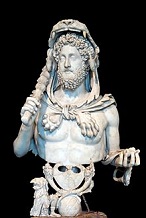

180 Roman consuls: Lucius Fulvius and Gaius Bruttius Presens. End of the Great Plague Era in Rome. The 200-year Pax Romana (begun -30) ends with a quiet flushing sound, the creepy 666 thang, and an attempt to launder bad guy Judas Iscariot? About this time Mt. Taupo (Hatepe) in New Zealand erupts (VEI-7, the most powerful volcanic eruption in history?), ejecting 7.2 cu mi. of Earth in a few min., turning the sky red over Rome and China; luckily New Zealand is uninhabited? On Mar. 17 Roman emperor (since 169) Marcus Aurelius (b. 121) dies (assassinated?) in his military HQ in Vindobona (Vienna), and is succeeded by his unworthy son Lucius Aelius Marcus Aurelius Antoninus Commodus (161-92) (born the purple and pampered all his life) as Roman emperor #18 (until 192) (the 18th in 180?), the first of a line of weak, dissolute emperors plagued by barbarians and political dissension who undermine and send the eroding empire down the commode for the next cent. until Diocletian; Commodus quickly makes peace with the Marcomanni and Quadi and returns to Rome; the Marcomanni are forced to return to Germania. A revolt of the Maeatae (ends 184), a confederation of the Dumnonii tribe of South Strathclyde and the Votadini, Selgovae, and Novantae tribes between Hadrian's Wall and the Antonine Wall begins with the assassination of gov. Caerellius Priscus and all his guards while inspecting Hadrian's Wall, causing new Roman gov. #30 of Britain (until ?) Ulpius Marcellus to be rushed in with the heavy hardware, later being called the most serious war of Commodus' reign. The Jewish Sanhedrin is moved to Beth (Beit) She'Arim in the Lower Galilee 12 mi. SE of Haifa (until 210). Huvishka I dies, and Vasudeva I (-210) becomes king of Kushan (until 210). About this time the Silver Age of Latin (begun 14) ends, and the Postclassical (Late) Latin Period begins (ends 535), which sees Latin corrupted by the invading barbarians with foreign forms and idioms, creating the Lingua Romana, which diverges from the Lingua Latina of the learned; meanwhile the Patristic Latin of the early Christian Church fathers is developed - if you want to be friendly, wear a pocketful of shells? Inventions: The rotary fan is invented in China - pass the dragon fruit? Science: About this year Leonidas of Alexandria becomes a physician and surgeon, following Galen in advocating the excision of breast cancer via a wide cut through normal tissues, but recommending alternate incision and cautery, which becomes the std. for the next 1.5K years; he provides the first detailed description of a mastectomy, incl. the first description of nipple retraction as a clinical sign of breast cancer, and advocates systemic "detoxification of the body" both pre and post-op. Nonfiction: She loves you, yah yah yah yah? About this time Smyrna-born Bishop Irenaeus of Lyons (130-202) writes Against (the) Heresies (Refutation and Overthrow of Gnosis, Falsely So Called) (5 vols.), which accuses Marcion of Sinope and other heretics of the One Gospel Fallacy, i.e., sticking to just one gospel to justify their misguided doctrines, the Jewish Christians sticking to Matthew, the Marcionists to Luke, the Christ-denying Gnostics to Mark, and the Valentinians to John, using Ezek. 1 to solve the equation, with the immortal soundbyte: "It is not possible that the Gospels can be either more or fewer in number than they are, for since there are four courners on the Earth in which we live, and four principal winds, while the Church is scattered throughout the world, and the pillar and ground of the Church is the Gospel... it is fitting that she should have four pillars" (3.11.7); Irenaeus then stokes Millennium Fever with the suggestion that since 6 precedes the perfect number 7, the number 666 embodies the original, present, and final revolts against God, while Jesus' number in Greek is 888 (5.28.2); Irenaeus also becomes the first writer to name the Four Evangelists (me, myself and Irenaeus?), causing later Christian paintings to show the four Gospel writers in the four corners (of the painting) as an angel (Matthew), lion (Mark), bull (Luke) and eagle (John); he denounces the 13-page papyrus Gnostic Coptic Gospel of Judas, "The secret account of the revelation that Jesus spoke in conversation with Judas Iscariot", which claims that Judas was the only disciple who understood and followed Christ (who mocks the others), and that Jesus actually asked Judas to betray him, and that therefore he's one cool dude; "Step away from the others and I shall tell you the mysteries of the kingdom"; "Look, you have been told everything. Lift up your eyes and look at the cloud and the light within it and the stars surrounding it. The star that leads the way is your star"; "You will be greater than all the others, Judas. You will sacrifice the man that clothes me"; "You will be cursed by the other generations - and you will come to rule over them"; a Coptic language copy dated to 280 is lost in the 4th cent., discovered in 1970 in a cave near El Minya, Egypt, put in a safe deposit box until it begins to deteriorate, and finally pub. in English trans. by the Nat. Geographic Society in Apr. 2006; written at a time when the Romans were killing Christians while the Christian bishops actually encouraged martyrdom, the whole thing is aimed at stopping their own bishops by guilt-tripping them? About this time Greek poet Oppian of Corycus (Anabarzus) (born in Corycus, Cilicia) writes the 5-vol. Halieutica, a poem on fishing dedicated to Marcus Aurelius and his son Commododus; early next cent. Oppian of Apamea (Pella) (from Apamea, Syria) writes the 4-vol. poem Halieutica II, a poem on hunting, but of inferior quality - maybe all them barbarians got to him? Deaths: Assyrian Christian writer Tatian (b. 120) in Arbela, Mesopotamia; first to declare that God created matter by the power of the Logos: "And as the Logos, begotten in the beginning, begat in turn our world, having first created for himself the necessary matter." Roman Catholic historian (St.) Hegesippus (b. ?); feast day: Apr. 7; a Jew born in Jerusalem who wrote a refutation of Gnosticism, a catalog of heresies, and a 5-vol. treatise on Christianity (lost except for quotations by Eusebius of Caesarea), becoming the first to adduce the argument that the bishops of Rome go back to the apostles and hence all heretics are full of it? Greek Christian theologian (St.) Melito of Sardis (b. ?); leaves Homily on the Passion, which incl. the doctrine of the Harrowing of Hell, based on Bible passages in Is. 24:21-22, Zech. 9:11, Eph. 4:8-10, 2 Cor. 2:14, Acts 2:27 and 2:31, 1 Peter 3:19-20 and 4:6, in which Jesus Christ allegedly descended into Hell and freed the righteous who died before he came, incl. Adam and Eve - the holy Mission: Impossible? Deaths: Greek traveler-geographer Pausanias (b. 110); leaves Description of Greece (Hellados Periegesis) (10 vols.), allowing links to be made between Greek classical lit. and modern archeology. Roman emperor (161-80) Marcus Aurelius (b. 121) on Mar. 17 in Vindobona (Sirmium?); leaves the camp classic Stoic philosophical Meditations (12 vols.) (161-80): "When you wake up in the morning, tell yourself: The people I deal with today will be meddling, ungrateful, arrogant, dishonest, jealous, and surly. They are like this because they can't tell good from evil. But I have seen the beauty of good, and the ugliness of evil, and have recognized that the wrongdoer has a nature related to my own - not of the same blood or birth, but the same mind, and possessing a share of the divine"; "Everything we hear is an opinion, not a fact. Everything we see is a perspective, not the truth."
181 The 240th Olympiad. Roman consuls: Lucius Aelius Aurelius Commodus Antoninus and Lucius Antistius Burrus.
182 Praetorian prefect (182-5) Tigidius Perennius talks Commodus into a foreign policy of diplomacy and containment, bringing 15 years of peace to the northern frontier, but Commodus' old advisors chafe, and a conspiracy insolving his sister and several senators is uncovered, causing confiscations, arrests, trials and executions whie the young emperor ignores it all to live in luxury while leaving the govt. to his ministers? Roman consuls: Marcus Petronius Sura Mamertinus and Quintus Tineus Rufus. Births: Chinese Wu emperor #1 (222-52) Sun Quan (Zhongmou) (d. 252); brother of Sun Ce (175-200). Christian bishop (self-castrated?) Origen (Gr. "born of Horus") Adamantius (Gr. "unconquerable") of Alexandria (d. 253) (b. 184-186?) in Alexandria, Egypt; eldest of nine children; his mother is not a Roman citizen, so neither is he?; well-to-do Christian father Leonides is imprisoned in 202 during the Severian Persecution and beheaded, confiscating the family's property, leaving them impoverished; he tries to turn himself in but his mother hides his clothes so he can't leave the house.
183 Roman consuls: Lucius Aelius Aurelius Commodus Antoninus and Gaius Avidius Victorinus.

184 Ulpius Marcellus quells the native Celtic revolt, causing commemorative coins to be issued and Commodus to assume the title of Britannicus; sporadic fighting continues for several more years, with the Romans ultimately abandoning the Antonine Wall and forts to the N of it at Newstead et al. and retreating to Hadrian's Wall. The Yellow Turban Revolt (Yellow Scarves Rebellion) by Taoist (Daoist) leader Zhang Jue (Chang Chueh) (Zhang Jiao) (-184) against the eunuch-controlled Dong Han Dynasty begins (ends 204), causing poor-but-clever (with royal blood in his veins) Liu Bei (Xuande) (161-223) to see his chance and raise a volunteer army to fight the rebels, obtaining the backing of two wealthy horse merchants and gaining several Vs, then being rewarded with appointment as prefect of Anxi in Zhongshan, which he resigns after refusing to work for a corrupt inspector, the fighting more rebels in Jiangsu, which gets him appointed as prefect of Gaotang, after with the 14th cent. novel "Romance of the Three Kingdoms" portrays him as the ideal benevolent ruler. The followers of the Way of the Five Pecks of Rice under Chang Lu in modern-day Szechwan begin a revolt (ends 215), establishing the independent Taoist state of Han Chung. Egyptian scribe Petaus of Karanis in upper Egypt stands up for fellow scribe Ischyrion of Ptolemais Hormou because he is just as literate as he, proved by being able to sign his name after practicing a few times? - showing that all the religious texts floating around have a very tiny audience? Roman consuls: Lucius Cossonius Aegius Marullus and Gnaeus Papirius Aelianus.
185 The 241st Olympiad. Praetorian prefect Tigidius Perennis is abandoned by Commodus to his enemies and executed. Roman consuls: Tiberius Claudius Maternus and Marcus Appis Atilius Bradua Regillus Atticus.
186 Roman freedman Marcus Aurelius Cleander (-190), chamberlain and favorite of Commodus becomes Praetorian prefect, later becoming infamous for selling the highest offices of the Roman state for filthy lucre. Rome's grain supply is secured by the creation of the Classis Africana, a special fleet. After a mutiny breaks out in Britain, Publius Helvius Pertinax (126-93) becomes Roman gov. of Britain #31 (until 187), surviving an attack on his bodyguard which leaves him for dead, after which he punishes the mutineers severely; too bad, he alienates his soldiers by being too kind and curteous, causing his forced resignation. Roman consuls: Lucius Aelius Aurelius Commodus Antoninus and Manius Acilius Glabrio.
187 Roman census. Roman consuls: Lucius Bruttius Quintius Crispinus and Lucius Roscius Aelianus Paculus. African-born Decimus Clodius Albinus (150-97) becomes Roman gov. #32 of Britain (until 197).
188 Roman consuls: Publius Seius Fuscianus and Marcus Servilius Silanus. Births: Roman emperor #22 (198-217) Caracalla (Marcus Aurelius Severus Antoninus Augustus) (Bassianus) in Lugudunum (modern-day Lyons, France); nicknamed Caracalla for his long Gallic tunic or cloak.



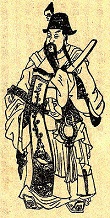
189 The 242nd Olympiad. On May 24 Eleutherius dies a martyr, and (St.) Victor I (-198) becomes bishop of Rome (pope #14) (first African pope) (first Christian author to write about theology in Latin); he struggles to have Easter celebrated according to the Roman (solar-based) (first Sun. after the first full moon on or after the vernal equinox) instead of the Jewish (lunar-based) (Quartodeciman) rite. Ling Di (b. 156) dies, and after #2 eunuch Jian Shuo (-189) sets a trap to kill He Jin (-189), elder brother of empress He (Lingsi) (Chin. "unattentive and deep-thinking") (-189) (Ling Di's 2nd wife) and make Ling Di's younger son Prince Xie Liu the emperor, He Jin learns of it and declares Lang Di's elder son Prince Liu Bian of Hong as Dong Han emperor #12 Shao (Chin. "young") Di (176-90) (until 189), with He and He Jin as regents; too bad, the eunuchs get He Jin assassinated, causing warlord Dong Zhuo (-192) to seize control of the capital Luoyang; hearing the good news, a mob led by pissed-off officials He Jin, Yuan Shao (Benchu) (-202) and Cao Cao (155-220) invades the capital of Liuyang to dispose of the Ten Eunuchs, who get He Jin beheaded in the palace courtyard then kidnap the new emperor and his brother, future emperor Xian Di, but get surrounded, after which head eunuch Zhang Rang jumps in the Yellow River and drowns, and the other eunuchs are executed; Dong Zhuo gains control over the Han Dynasty and moves the capital to Changan, removing Shao Di and making his brother Liu Xie into Dong Hong emperor #13 (last) Xian (Chin. "wise") Di (181-234) (until 220). Roman consuls: ? Dulius Silanus and Quintus Servilius Silanus. Births: Roman emperor #23 (211) Publius Septimius Geta (d. 211); younger brother of Caracalla.
190 Roman emperor Commodus founds Rome anew, declaring himself the new Romulus, and announcing a new Golden Age; he relaxes the persecution of the Christians while becoming more despotic towards his own kind? The Catechetical School of Alexandria (Didascalium) is founded; by now Egypt is throughly infected with Christianity, with 40 bishoprics in the Nile Delta area? A Christian council called by Pope Victor fixes the following Sunday as the day to celebrate Easter, rather than the 14th of Nisan; when the churches of Asia Minor refuse to change, he excommunicates their bishops. About this time the modern abacus with beads is mentioned by Xu Yue in a book on the Eastern Han Dynasty. Roman consuls: Lucius Aelius Aurelius Commodus Antoninus and ? Petronius Sura Septimianus. Deaths: Greek Christian apologist Athenagoras of Athens (b. 133); leaves Supplication (Plea) for the Christians (Legatio pro Christianis) (177), addressed to Marcus Aurelius to defend Christians against charges of atheism, incest and cannibalism; The Resurrection of the Dead (De Resurrectione Mortuorum) (180); the first written reference to the Trinity - like he learned in Greece from Plato fans?


191 Vologases IV dies, and his son Vologases V (-208) becomes king of Parthia (until 208), defeating rival Osroes II in Media. Emperor (since 130) Seimu (b. ?) dies, and Chuai (Chuuai) (149-200), son of Prince Yamato Takeru and grandson of emperor #12 Keiko becomes Japanese Yamato emperor #14 (until 200). Roman consuls: ? Opilius Pedo Apronianus and Marcus Valerius Bradua Mauricus. Deaths: Japanese Yamato emperor #13 (130-91) Seimu (b. ?).
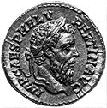
192 Roman consuls: Lucius Aelius Aurelius Commodus Antoninus and Publius Helvius Pertinax. On May 22 Dong Zhuo is assassinated by his adoptive son Lu Bu (-198), "the Flying General" (the Chinese Achilles) (master of horseback riding and archery, known for wielding his Sky Piercer atop his steed Red Hare) after a plot by interior minister Wang Yun; Xian Di becomes a puppet of the feuding warlords. On Dec. 31 Roman emperor (since 180) Commodus (b. 161), who is fond of dressing in lion skins and carrying a club like Hercules is drugged by his concubine Marcia, then strangled in his bath in the gladiator school by a wrestler named Narcissus working for impertinent prefect of the city of Rome Publius Helvius Pertinax (126-93) (son of a timber merchant in NW Italy who works his way up from centurion to prefect of a cohort, Rhine fleet cmdr., procurator of Dacia, senator, consul, and proconsul), who declares himself Roman emperor #19 (until 193) after fooling the Praetorians to think that Commodus had died of apoplexy after elevating him to the throne? Deaths: Roman emperor #18 (180-92) Commodus (b. 161) on Dec. 31 in Rome (assassinated.

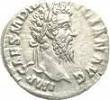

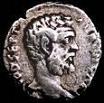
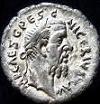
193 The 243rd Olympiad. On Jan. 1 the Senate ratifies the election of experienced, strict, and frugal Roman emperor (since 192) Pertinax (b. 126), and flushes, er, brands the memory of Commodus with eternal infamy, taking away his honors and erasing his titles from public monuments, demolishing his statues, and dragging his body with a hook into the dressing room of the gladiators, but Pertinax insists on giving him the last rites, with Commodus' brother-in-law Claudius Pompeianus giving the oration; Pertinax gives his personal fortune to his wife and son, refuses to elevate them to Augusta and Caesar, rights the wrongs caused by Commodus (who leaves 8K pounds in the treasury, compared to 22M left by Pius), and holds frugal banquets which are ridiculed by those who are used to the elaborate shindigs of his predecessor; too bad, when they find he's going to reform them, the Pretorian Guards, led by Laetus begin to plot against him, and on Jan. 3 attempt to acclaim a senator as emperor, but he chickens out, then try again with consul Sosius Falco, whom Pertinax pardons; on Mar. 28 200-300 Praetorian Guards break into his palace and murder him, carrying his head back to camp on a lance; on Mar. 28 he is succeeded by Roman Sen. Marcus Didius Salvius Julianus Severus (Didius Julianus) (137-93) (relative of Antonine jurist Salvius Julianus), who is declared Roman emperor #20 after winning an auction at the Praetorian camp (25K sesterces per soldier) (6250 drachms) (200 pounds sterling), outbidding Sulpicius, father-in-law of Pertinax, who sees the latter's head carried into the camp on a lance; when the news spreads to the legions, civil war results, with Didius Clodius Albinus (150-97), gov. of Britain (since 192), Lucius Septimius Severus (145-211), gov. of upper Pannonia (Apr. 9) (the winner), and Gaius Pescennius Niger (140-94), gov. of Syria (Apr. 19) all declaring themselves emperor; Severus marches on Rome, causing Didius Julianus to be executed on June 1 by order of the Senate as he approaches within 50 mi.; Severus then strikes a deal with Albinus promising to make him Caesar, then begins the siege of Byzantium in autumn, meanwhile defeating Niger in the Battle of Cyzicus and Battle of Nicaea in Dec. Toledo, Spain is annexed by the Roman Empire. Roman consuls: Quintus Pompeius Sosius Falco and Gaius Julius Erucius Clarus Vibianus. Births: Roman emperor #40 (253-60) Valerian (Publius Licinius Valerianus) (d. 260); father of Gallienus (218-68). Deaths: Roman emperor Didius Julianus (b. 137) on June 1 (executed).
194 In the spring Pescennius Niger (b. 140) is defeated by Lucius Septimius Severus at the Battle of the Cilician Gates in Issus (near modern-day Alexandretta, Syria), retreats S to Antioch, and is executed in Apr.; the Senate declares Septimius Severus as Roman emperor #21 (until 211), and he graciously has his Caesar Clodius Albinus made consul, dissolving the all-Italian Praetorian Guard and recomposing it with legionary veterans. The Romans lose Nisibis. Roman consuls: Lucius Septimius Severus Pertinax and Decimus Clodius Septimius Albinus.
195 The Romans under Septimius Severus attack the Parthians under Vologases V; Severus and Albinus have a falling-out after the latter claims full equality, and in Dec. the crowd at the Roman Circus Maximus cries for them to reconcile, but they don't. 7-y.-o. future emperor Caracalla (188-217) sees his playmate severely punished for flirting with conversion from Christianity to Judaism, messing his mind up for life? Roman consuls: Publius Julius Scapula Tertullus Priscus and Quintus Tineus Clemens.

196 Byzantium falls, and Severus returns to Rome, revokes Albinus' title of Caesar and has the Senate declare him an enemy of Rome, then declares his 9-y.-o. son Caracalla (Marcus Aurelius Severus Antoninus Augustus) (188-217) as Caesar and heir; Albinus invades Gaul, using Lugdunum (Lyons) in EC Gaul as his capital. Cao Cao of Wei (155-220) rises to power in China and moves emperor Xian Di to Xu as his puppet, using him to issue edicts as he tries to unify China (until 220). Bardaisan meets Christians among the Parthians, Bactrians (Kushans) and peoples in the Persian empire. Roman consuls: Gaius Domitius Dexter and Lucius Valerius Messala Traseja Priscus.

197 The 244th Olympiad. Do the moves, do the moves, let's see ya do the moves? On Feb. 19 Clodius Albinus (b. 150) is defeated by Severus and Caracalla at the Battle of Lugdunum (Lyons) in a bloody battle (150K on each side?), and commits suicide; the city is sacked and never recovers its prosperity; Albinus' supporters in Gaul and Italy are executed; (Lucius) Virius Lupus (160-206) becomes Roman gov. of Britain #33 (until 202), rushing to stabilize the rebellion-torn province and being forced to buy peace from the pesky Maeatae to keep them from allying with the Caledonian Confederacy; he goes on to slowly restore forts in the Pennines to Roman control, but doesn't get around to rebuilding Hadrian's Wall; Sextus Varius Marcellus (165-215) is sent from Syria to assist him as Roman procurator (tax collector), signaling a later division of Britain into two provinces? Caracalla changes his name from Septimius Bassianus to Marcus Aurelius (Severus) Antoninus to strength his bond with the Antonines. Severus and Caracalla declare war on the Parthians (ends 199). Satrael (-201) becomes king of Scotland. Severus completes the process of appropriating the wealth of the aristocracy to support a bigger army, creating three new legions, one of which he quarters near Lake Alban in Italy, which had never been militarized; he goes against Augustus' rule of appointing only senators in military posts, placing equestrians there instead, and raising soldiers' pay; the area within a 100 mi. radius of Rome is given over to the prefect of the city, and the rest of Italy to the praetorian prefect; he starts raising taxes and subdivides provinces into smaller units to get more; he depreciates the silver content of the denarius to below 60% while engaging in magnificent building projects in Rome, Africa. and Syria. Liu Bei deploys an army from Xu Zhou to attack Cao Cao. Despite Christ not returning as soon as he seems to have promised, Romanized pagan lawyer from Carthage Tertullian (155-240) converts to Christianity (probably aided by the spectacle of the Christians in the arena) and immediately begins vigorously promoting it, becoming the first to call it the "true religion" (vera religio); his writings coin the terms sacrament, resurrection, trinity, person (in the trinity), substance, and New Testament, and give Christianity a new lease of life by being the first written in Latin; too bad, he begins speaking out against classical culture and Roman power, drawing the 3rd cent. persecutions? - and if he was black, back atcha? Pope Victor debates with Polycrates of Ephesus, metropolitan of proconsular Asia over the Quartodeciman observance of Easter on the Jewish Passover, demanding that they observe it on Sunday. Roman consuls: Titus Sextius Lateranus and Lucius Cuspius Rufinus. Deaths: Roman usurper emperor Decimus Clodius Albinus (b. 150) on Feb. 19 in Lugdunum (Lyons) (suicide).

198 The Romans under Septimius Severus invade Mesopotamia, occupy Nisibis and capture the Parthian capital of Ctesiphon, plundering it this year and next and capturing many Parthian slaves. St. Victor I dies, and (St.) Zephyrinus (-217) is elected bishop of Rome (pope #15). Chinese Achilles Lu Bu is defeated and captured by Cao Cao in Xiapi, then hanged at the suggestion of Liu Bei. Roman consuls: Publius Martius Sergius Saturninus and Lucius Aurelius Gallus.
199 Roman consuls: Publius Cornelius Anullinus and Gaius Auphidius Fronton. Millennium Fever grips a relatively small segment of the Roman Empire, if any, since the original first cent. Christians have all died, and the new generation still is in a state of denial that dear Jeezy didn't come back in the lifetime of his apostles like he apparently promised, if he was quoted correctly, time to read the Latin trans.? Severus wins the Parthian War (begun 197), and reconstitutes the province of Mesopotamia under an equestrian gov. with two legions; meanwhile he unsuccessfully sieges the Arab fortress at Atra W of the Tigris River. Nonfiction: By this time the following Christian works are circulating: The Apocalypse of Paul, The Acts of Peter and Paul, The Acts of Paul, The Acts of Thomas (the only apocryphal "Acts of" to survive in its entirety) (his journey to India, a wild ass that gives a sermon, and his martyrdom after converting the wife of an offical to asceticism and pissing-off her hubby), The Infancy Gospel of Thomas (Jesus brings clay sparrows to life, raises a child from the dead, and lengthens a board his carpenter daddy Joseph had cut too short), and The Acts of Thecla.